







06
We catch up with the UK Cinema Association to see out the year.
23
Our Supplier Showcase where you can hear from the manufacturers.
08
Find out what DCM Upfrontst is all about with Steve Davis.
46
Looking to enter the world of CInema Technology - It’s DCI
10
Learn all about the FCPA and how to combat piracy in cinemas.
50
Take a Tour with us and learn aboout Barco’s facility in Kortrijk
12
We are excited to support the FCPA’s awareness and offer a £2,000 prize.
54
Tea time: Spend fiveminutes with... our engineer Mark.
Get in touch with us at Omnex…
It’s no secret that 2024 has had its fair share of challenges, from the strikes to a thinner film slate. But as always, the cinema industry’s resilience shines through, and here at Omnex, we’ve been proud to support so many cinemas through it all.
We’ve grown our team, welcoming two new engineers, Peter and Glen, along with Rebecca as our new Exhibitor Relations Manager. At the same time, we’ve maintained our best-value pricing and advanced our NOC monitoring services, consistently delivering on our goal to demonstrate value.
We’ve had a number of stand-out moments in recent months. From being recognised as a PostProduction Partner for Barco, to being signed up to their Partner Program to offer the best level of pricing for cinemas. We even - busman’s holiday style - spent two days visiting their factory in Belgium. From seeing how projectors are built, to watching their new HDR projectors in action. It was a reminder of just how far cinema technology has come. It felt like catching a glimpse of the future—one that promises a brighter, sharper, and more immersive cinema experience. Moments like that remind us why we do what we do: bringing the magic of cinema to life.
In the midst of this challenging year, cinema advertising has remained a bright spot. As you’ll read in this issue, Digital Cinema Media (DCM) continues to position cinema as a powerful
platform for advertisers. Brands are recognising that cinema offers something unique: a fully engaged, captive audience. And with a blockbuster Q4 film slate on the way, from Transformers One to Paddington in Peru, the opportunities for cinemas to drive revenue through advertising have never been stronger.
One initiative I’m particularly excited about is our partnership with the Film Content Protection Agency (FCPA). While piracy remains a serious threat to the cinema industry, it’s cinema staff who play a vital role in keeping our films safe. To encourage participation in the FCPA’s autumn quiz, Omnex is doubling the prize to £2,000—and the winner will also receive two tickets to the UK Cinema Association’s Christmas party in London. This is an incredible opportunity for your team, so please make sure to share this newsletter with everyone!
This year, we’ve had the privilege of working on some fantastic projects, like the upgrades at Gwyn Hall. Their team’s reaction to the improved picture and sound quality reminds us of the power of cinema to truly transform an experience. From NEC laser projectors to Dolby audio systems, we’re proud to help future-proof cinemas for years to come. We’ve installed a number of accessibility systems, supporting Built For Good’s WatchWord technology, designed to enhance the cinematic experience for all audiences, ensuring cinemas are inclusive spaces.

Despite the challenges, there’s so much to look forward to. With an exciting film slate ahead, growing partnerships, and continued efforts to protect the films we love, we remain ever optimistic. And at Omnex, we’re ready to support
you through the rest of 2024 and beyond. Thank you for your continued trust—we’re here when you need us.
Simon Tandy, Managing Director.

Were the cinema year to be subject to a regular school report, I think it fair to say that any score that for the Summer term would be considerably more positive than that for the Spring months, where a - for the most part - moribund slate had cinema operators big and small tearing out whatever hair they had left after the twin challenges of the pandemic and the cost of living crisis.
The final months of 2023 had already given us a good idea of what to expect, with the actors’ and writers’ strikes in the USalthough thankfully resolved by the end of Septemberlaying waste to films then in
production and causing those due for release to be pushed back (and back) in the absence of any cast being available for promotional activities.
If no experience was quite as jarring as seeing the starry array of names attached to Christopher Nolan’s (ultimately) multi-Oscar winning Oppenheimer beat a hasty retreat from the red carpet at its UK premiere, the date of which unfortunately coincided with the Screen Actors’ Guild confirming plans to join the screenwriters in their action, then the subsequent (and understandable) loss of Dune: Part Two from November of that year made clear that UK operators in particular could look forward to a diet of scraps over the coming months, or at least until the wheels of Hollywood had cranked back into action.
Thus, while there were undoubtedly highlights in the last months of 2023 and into the New Year – including Wonka and the aforementioned Dune sequel - many operators must at that time have viewed the early Summer months, and their promise of significant box office, as some far-off land.
Thankfully those days did finally come, and it has to be said that the water during those months was even lovelier than they promised, with Inside Out 2, Despicable Me 4 and Deadpool and Wolverine all undoubtedly exceeding expectations by some way, heading in some cases to £50 million plus and beyond.
While the challenges certainly aren’t over –the September lull in releases which was a regular feature of cinema life pre-pandemic seems somehow to be being felt more keenly this time around – the arrival of Joker: Folie à Deux at the beginning of October presages the start of a period of extraordinary strength for the slate with something for everyone.
The experience of the last few years has very much been that ‘when the films are there, so are
audiences’, with last year’s unique Barbenheimer cultural moment and the success of the likes of Top Gun: Maverick providing ample evidence of the public’s continuing appetite for big screen entertainment.
Sadly, there have been too many occasions during that time when in terms of studio product, and for entirely understandable reasons, the first part of that equation has simply not been met, and – unlike perhaps in some other prominent European film territories – UK operators have not had strong domestic films to fall back on.
So the sense of excitement (and relief) at the prospects for the likes of Paddington in Peru, Gladiator 2, Mufasa, Moana 2, Wicked, Venom: the Last Dance, Sonic 3 and more is palpable and a hope that we’ll enter the New Year in much finer fettle than was the case 12 months ago.
See you at the movies!
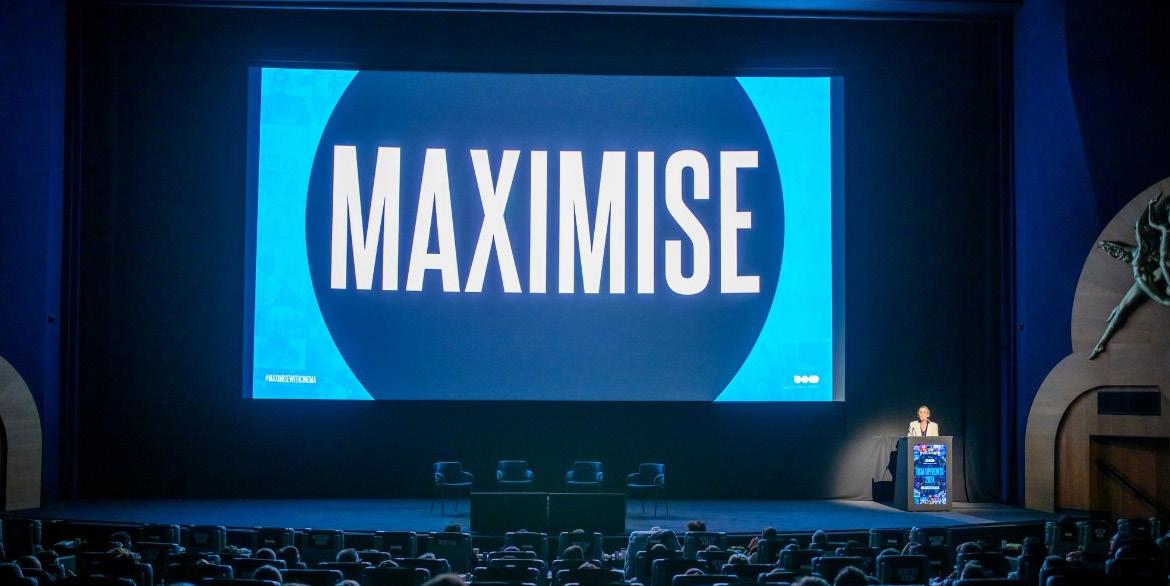

The landscape of modern media consumption is in constant flux, shaped by technological innovations and constantly changing viewer habits. As a result, the ways advertisers approach their audiences have evolved dramatically. In this dynamic environment, Digital Cinema Media (DCM) has emerged as a major player in the realm of cinema advertising, as we position cinema as a unique medium that connects brands with captivated audiences to maximise AV (Audio Visual) advertising campaigns.
Cinema has a unique advantage in an era of digital and streaming dominance, where audiences often binge-watch content or access ad-free platforms, cinema provides a rare and valuable advertising opportunity: a captive audience. Unlike television, where viewers can change the channel or make a cuppa during a commercial break, or digital platforms, where ads are often skippable, cinema offers an environment where the audience is fully focused on the Mother of all screens. The immersive nature of the cinema experience makes cinema advertising uniquely impactful, which is why DCM takes our responsibility so seriously. In providing cinema audiences with engaging and entertaining adverts.
DCM have long been the market leader in UK cinema advertising, delivering campaigns
for global, national and local brands across Cineworld, Odeon, Picturehouse, The Light, Vue and over 200 Independent cinemas; including Reel, Savoy, Merlin, Cinema in the Power Station, GFT, HOME, QFT, Tyneside, Zeffirellis… there are genuinely too many amazing cinemas to name. As the industry returned from CineEurope ‘24 we were keen to share some of the amazing new films (please can we stop calling them content!), so we took over the prestigious Odeon Leicester Square (OLS) and welcomed the greater good of ad land to this iconic building for our annual Upfronts event.
In the advertising industry, Upfronts are events where media companies present their upcoming season’s programming to advertisers, giving them a chance to buy ad space ahead of time, often at a premium rate. The shift toward Upfronts in the cinema advertising industry highlights the growing relevance of cinema as a powerful advertising medium. Everyone wants to advertise in the next Barbenheimer and Upfronts is a critical platform for brands to secure cinema advertising spots as we approach our busiest quarter - Q4!
ALWAYS LOOKING FORWARD, DCM Upfronts also offers insight into data on audience trends, previews of how DCM will innovate the incinema advertising experience and a panel of key cinema and advertising industry leaders, allowing other brands to gain an in-depth
understanding of how cinema advertising can complement their marketing strategies. This year our panel comprised of Hotpoint, L’Oréal and Sky, showcasing how their ‘Start With Cinema’ strategies drove cultural resonance and maximised brand moments.
Karen Stacey (DCM CEO) highlighted cinema’s unmatched power to engage audiences through shared, immersive experiences and how the results speak for themselves. Cinema advertising has led to a +50% uplift in Community Association and a +12% boost in Brand Fame
This kind of audience connection benefits everyone, as brands increasingly recognise the value of advertising on the big screen and Exhibitors get the immediate financial benefit of cinema advertising revenue.
Burst Your Bubble, the research and thought leadership agency, revealed that 98% of cinema showings are co-viewed, a figure far higher than TV or YouTube. This shared environment enhances both the cinematic experience and the ads. Karen Stacey noted: “For cinema, ads and trailers are an integral part of the experience. It’swhereaudiencesarereceptivetohigh-quality content. That’s why brands should include cinema in their media plans.”
Cinema is the shared medium
While cinema advertising is a critical component to a cinema’s business model, the upcoming film slate is an essential tool in driving footfall and audience engagement. The DCM CineEurope Film Guide (email me if you would like a copy at steven.davis@dcm.co.uk) in which we diligently capture EVERY film presented - with something for everyone, from Transformers One (11/10) to Gladiator II (15/11) and the most family-friendly Q4 I can recall; Paddington In Peru (8/11), Wicked (22/11), Moana 2 (29/11) all perfectly timed for brands to advertise this Christmas’ must-have items!
Karen Stacey summed it up well at Upfronts “This is not just about the films, but the emotional and cultural resonance cinema offers. When brands align with cinema, they tap into a powerful connection audiences feel, making campaigns more memorable. The months ahead will show how content and brand engagement combine to create a strong season for cinemas.”
DCM Upfronts have successfully positioned cinema as a modern and innovative advertising platform, offering a rare combination of audience immersion and high-impact storytelling. For brands looking to make a memorable impression, the cinema remains one of the last bastions of true, distraction-free advertising.
At Omnex, we understand that the magic of cinema extends beyond the screen –and that protecting the films we all love is a collaborative effort. As the threat of piracy remains ever present, safeguarding the creative process is essential to ensuring audiences enjoy films as intended; on the big screen.
This autumn, Omnex is proud to enhance its support for the Film Content Protection Agency (FCPA), which trains cinema staff to stay vigilant against piracy. Through regular quizzes, the FCPA provides the tools needed to protect valuable content. To boost this initiative, Omnex is doubling the cash prize for the autumn quiz, offering a £2,000 prize pot for participating staff who complete it successfully.
We encourage cinemas to spread the word and engage their team members in this effort to help protect the future of cinema.
Film piracy remains an ongoing and significant problem to the industry and those who work in it. Over 90% of pirated versions of newly released films are still sourced in cinemas by illegal activity involving the use of compact digital recording devices , primarily smartphones.
At a time of ever more UK-first, as well as global ‘day and date’ (simultaneous) film releases, the UK and Ireland are particularly vulnerable to illegal recording activity in cinemas.
Film distributors are deeply committed to safeguarding the rights of the creators of the films they release to audiences. By protecting copyright, not only are creators’ rights upheld, but also importantly, the industry’s own capacity to reinvest and develop new projects and talent is enhanced, ensuring that the UK and Ireland remains one of the world’s leading markets for filmed entertainment.
The main focus of the FCPA’s work is to prevent infringing (pirated) versions of films originating from cinemas in the UK and Ireland. FCPA works with cinema operators, law enforcement and other bodies in the UK, Ireland and worldwide. The FCPA programme plays an essential role for the film industry by safeguarding intellectual property, combating piracy and protecting the box-office.
The role of cinema staff, who are in the frontline of spotting and disrupting the activity through effective vigilance and awareness, is vital in tackling the problem. Hence, the FCPA’s efforts extend beyond enforcement activity. They work closely with staff at cinemas across the UK & Ireland to develop this awareness and vigilance.
Cinema staff are usually the first line of defence in this fight, and the FCPA equips them with the knowledge and tools to spot suspicious behaviour, take the appropriate action and potentially receive a reward.

Andy Leyshon, CEO of the FDA
“Protecting the hard work of creatives and the significant investments made by our members, is essential for the future of the film industry. The collaboration between the FDA and partners like Omnex underscores the strength of our collective efforts to combat piracy and safeguard the integrity of cinema for audiences and creators alike.”

Phil Clapp, CEO of the UKCA
“Cinema staff play a critical role in the fight against piracy and are often on the frontline of efforts to protect film content. Initiatives such as the FCPA quiz are vital in equipping them with the knowledge and awareness needed to help safeguard our industry and ensure the future of cinema for all.” YOU COULD £2K! WIN

The Film Content Protection Agency (FCPA) was formed in 2016 by the Film Distributors’ Association (FDA). Its aim is to make cinema releases as secure as possible by protecting the content – and thereby safeguarding the intellectual property rights of film distributors and the creators whom they represent.
The FCPA, working closely with the UK Cinema Association (UKCA), law enforcement agencies and other industry bodies, lead initiatives that highlight the critical work they do in protecting film content from piracy, and especially at source.

One of FCPA’s core objectives focuses on the development and delivery of anti-piracy awareness amongst those who work in cinemas across the UK and Ireland.
To support this, their online resources include a multiple-choice quiz for cinema staff, with a winner randomly selected every quarter.
To encourage more cinemas to get involved, Omnex is also contributing to the FCPA’s Autumn quiz. This year, we’re matching the FCPA’s £1,000 prize doubling the prize amount to £2,000, creating even more incentive for cinema staff to participate.


In an industry where creativity meets commerce, safeguarding intellectual property has never been more critical. Simon Brown, Director of the Film Content Protection Agency (FCPA), stands at the forefront of the UK’s fight against film piracy. With over three decades of experience in investigation and security, Simon has dedicated the last 18 years to protecting cinema content from the evolving threat of illegal recordings. Under his leadership, the UK’s anti-piracy programme has flourished, setting a global benchmark in the prevention and detection of piracy in cinemas.
Simon’s unwavering commitment to the cause has earned him accolades and recognition within both the UK and the wider European cinema industry, making him a central figure in the ongoing battle to protect film content from piracy’s grasp.
In this exclusive interview, we delve into Simon’s journey, the challenges posed by modern piracy, and the vital role cinemas play in this mission. Join us as we explore the world of anti-piracy through the eyes of a man who has made it his life’s work to stay one step ahead of those who threaten the integrity of the cinematic experience.
QWhat are the biggest challenges in the fight against piracy?
Piracy is a very complex issue that cannot be addressed with a single solution. Our challenges change as technology develops. Specifically, to our programme there have been huge developments in the world of smartphone technology since we started looking at the camcording issue back in 2006. At that time cammers were quite limited in what they could use to record film content in cinemas and relied mainly on relatively big and bulky camcorders (hence the term “cammers”). However nowadays we are faced with the challenge of offenders using small, compact devices (mainly smartphones) which are not only easier to conceal but widely possessed.
Cammers continue to be creative, and devices other than smartphones are still occasionally used - we had a particularly interesting case in the UK a few years ago where a person attempted to use two small digital cameras fixed together to record a 3D theatrical film in 3D. Thankfully fantastic vigilance and awareness by staff at the cinema led to him being spotted and arrested. We subsequently tested the device, and an infringing 3D pirated version was easily reproduced, which could then be played on a 3D television. Up until then there was a perception that 3D films could not be camcorded, but this case proved otherwise. Pirates will always
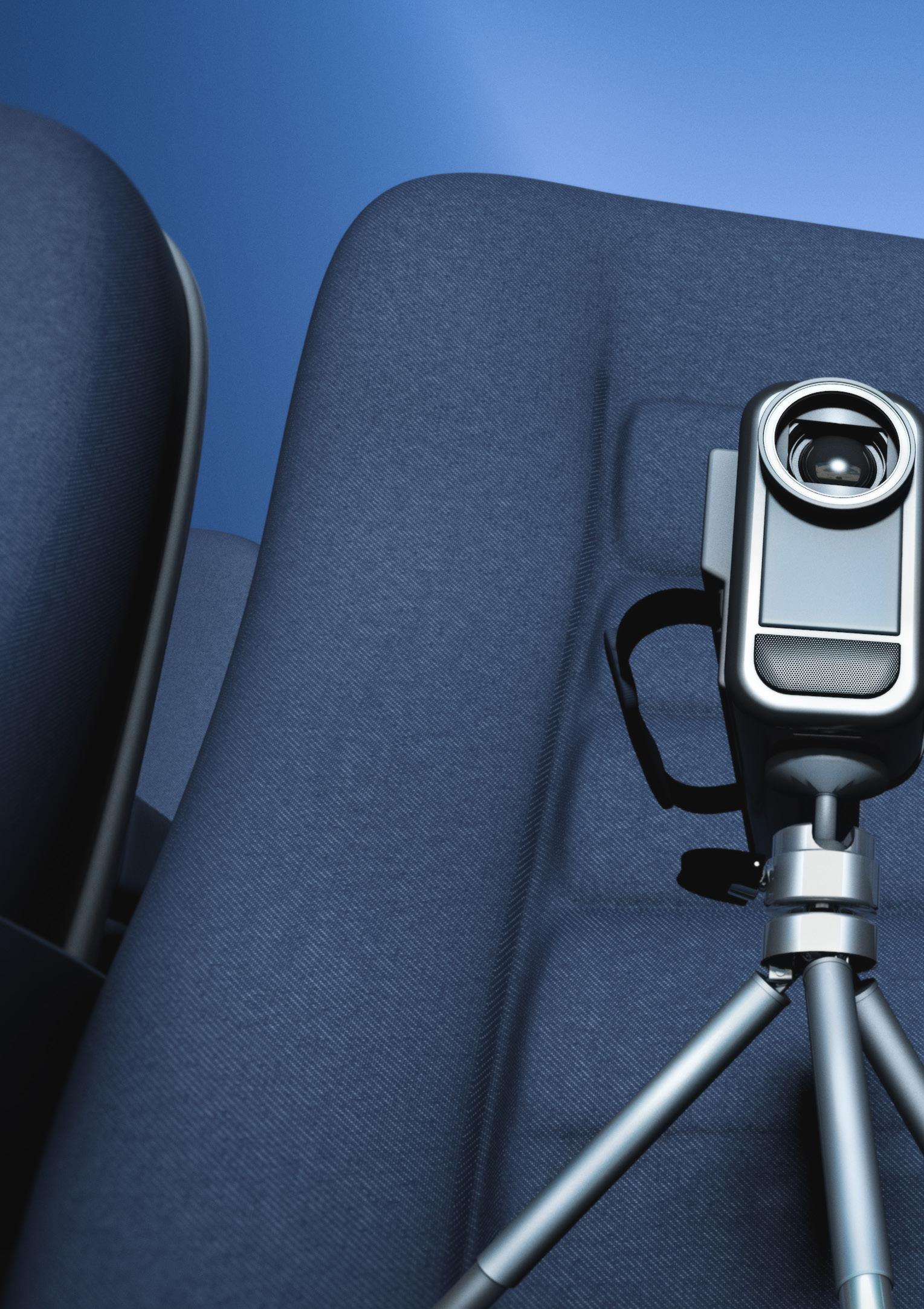
try to overcome barriers, so we have to try to be one step ahead – and anti-piracy vigilance and awareness of cinema staff remains crucial in our ongoing fight.
Aside from technological advances, “consumer confusion” around film piracy remains a serious challenge; it’s often very difficult for the average internet user to differentiate between illegal and legal content. There is an assumption that an online video streaming site, especially one with membership fees, is providing legal content. Unfortunately, that is not always the case, but many consumers remain unaware.
QDo you have any personal experiences or anecdotes about piracy?
Inevitably I’ve seen some very interesting things whilst in this fascinating world of antipiracy over the last 18 years or so. Working in partnership with other agencies and bodies on high-impact investigations is always rewarding and interviewing suspects in custody with law
enforcement has been of particular interest and invaluable in determining the motives, methods and sometimes madness of the offenders. For example, several years ago, after tracking down a repeat camming offender, he was arrested and interviewed at the local police station. We then recovered some old emails from his laptop, which he had sent to the cinema manager asking if he could take a long plank to the cinema on his next visit – he claimed he was disabled and needed it to support his back. Clearly this appeared like madness, so he was asked about it during an interview – only to admit his intention was to place the plank across the armrests of the seats in the cinema and sit on it – thereby raising both himself and the camera above the seats in front to camcord better footage! To this day I don’t think he had considered how odd and suspicious this would have looked!
Q What excites you about the future of your industry sector?
I remain very optimistic about the future. Nothing compares to the sheer magic of watching a new film in a lovely cinema – the huge screen, the brilliant sound, the entire experience – and not forgetting the copious amount of popcorn! Cinemas certainly aren’t the same places they were in the past, and many now offer unique entertainment experiences. Let’s look forward to further developments as the industry recovers, hopefully with new formats and approaches. As for the anti-piracy world, and who knows what is around the corner. Technology is clearly a huge and significant driver and collectively the industry must continue to examine how it can help tackle the problem.
Q What message would you like to send to cinemas that haven’t yet engaged with the FCPA’s resources?
Please look at our online resources – especially the “cinema hub” here:
https://filmdistributorsassociation.com/ safeguarding-copyright/cinema-zone/bestpractice/
Increase your awareness and vigilance of filmpiracy - to protect not just the film content, but also the cinema, your jobs and the local community. Please enter the quiz and the lucky winner will receive an amazing prize of £2000 in December –what a brilliant early Christmas present!
Good Luck!!


Simon Brown is the Director of the (FCPA) in the UK.
The FCPA is part of the Film Distributors’ Association Ltd. (FDA) - the trade body for theatrical film distributors in the UK and Ireland, which works in partnership with other bodies who share the goal of safeguarding films from piracy.
Simon has 33 years of experience in the fields of investigation and security, in both the public and private sectors, having previously worked for Lancashire Police, the BBC and FACT (Federation Against Copyright Theft).
He has spent the last 18 years specialising in the protection of film content from piracy in cinemas in the UK and Ireland, by focusing on the detection and prevention of illegal recording activity.
The UK anti-piracy programme for UK cinemas, which Simon has managed and developed since it was introduced in 2006, is unparalleled worldwide, and has a proven track record of success
Simon holds a Bachelor of Science (BSc Hons) from the University of Sheffield. He was presented with the “IP Champion Award” on British IP Day 2018 for his exceptional work in safeguarding the UK from illegal recordings in cinemas, and also received a Gold Award at CineEurope in 2019 for his exceptional contribution both to the ongoing success of his organisation and also to the wider European cinema industry.
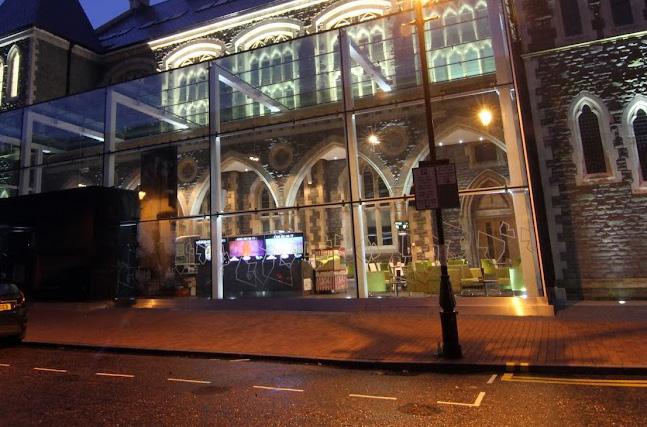
At Omnex, we believe that every upgrade should be a collaborative process, aligning closely with our clients’ vision while delivering technology that truly enhances the experience for both audiences and staff. When Gwyn Hall approached us to modernise their cinema technology, we took the time to fully understand their goals and ensure we delivered a solution that not only met their needs but would also support them well into the future.

MEETING THE VISION: A TAILORED SOLUTION
Gwyn Hall wanted to bring their three screens up to the latest standards in projection technology. After detailed discussions with their team, we recommended NEC’s Laser projectors. For their main screen, we chose the NC1803ML, offering powerful brightness and exceptional clarity. For the smaller Screens 2 and 3, the NC603L projectors were the perfect fit. Each projector was tailored to the unique requirements of the screen it was serving, ensuring an optimal viewing experience.
One of the more challenging aspects of the installation was in the Studio
(Screen 3), where space was limited. Working closely with Gwyn Hall’s team, we mounted the projector from the lighting rig using an MN Mounting bracket, preserving the space while maintaining perfect picture quality.
The feedback from the cinema has been overwhelmingly positive. As their team noted, “The difference in picture quality is night and day. The sharpness and brightness really make you feel immersed in the film. It’s like seeing movies in a whole new way.” This reaction is exactly what we aim for when implementing a technology upgrade of this scale.
“The goal was to find technology that not only delivered cutting-edge performance but also future-proofed GwynHallforyearstocome.Wewanted to give them the tools to stay ahead in a
This project sets the stage for many years ahead, future -proofing Gwyn Hall for years.

competitive market, and the NEC projectors and Dolby processors have definitely achieved that.”
Upgrading the audio system was a key part of the project. Gwyn Hall’s aging Dolby CP750 processors needed replacement, so we recommended the Dolby CP950 models for improved sound clarity and a more intuitive, webbased interface.
The feedback was immediate: “The upgrades have completely transformed the atmosphere in our cinema. Audiences are raving about the sound and picture quality—it’s made a big difference.” This response confirms we’re not only meeting technical needs but enhancing the guest experience.
The CP950’s interface also simplifies day-to-day operations, making it easier to manage sound in each auditorium.
“ We ensured the upgrade process was seamless for both staff and audiences, and the positive feedback reflects this.”
No project of this scope can be achieved without a dedicated engineering team. Blade, Geoff, Nigel, Darren, and Peter were essential in bringing the vision to life, handling both installation and problem-solving.
For example, when installing the NEC projectors, they balanced technical performance with the need to avoid disrupting Gwyn Hall’s
operations. Their expertise ensured a seamless installation with minimal downtime.
The upgrades at Gwyn Hall have already transformed the way their audience experiences cinema, but this is just the beginning. With the new technology in place, the cinema is in a prime position to keep evolving. In fact, we’ve already started discussions with the team about a potential upgrade from 5.1 to 7.1 sound, which would take their audio experience to the next level.
As the team at Gwyn Hall said, “With these upgrades, we’re excited to offer a cinema experience that rivals the best in the industry. Our team is thrilled with how seamless the new systems are, and we’re already thinking about the next steps to enhance it further.”
“This project sets the stage for even more enhancements in the future. With the groundwork we’ve laid here, Gwyn Hall is in a fantastic position to keep raising the bar on what a modern cinema experience should be.”
The project at Gwyn Hall is a testament to the power of collaboration, careful planning, and the right technology. We’re proud to have been a key role in their journey and look forward to seeing how they continue to push the boundaries of what their cinema can offer.
Steve Case, Technical Sales Manager
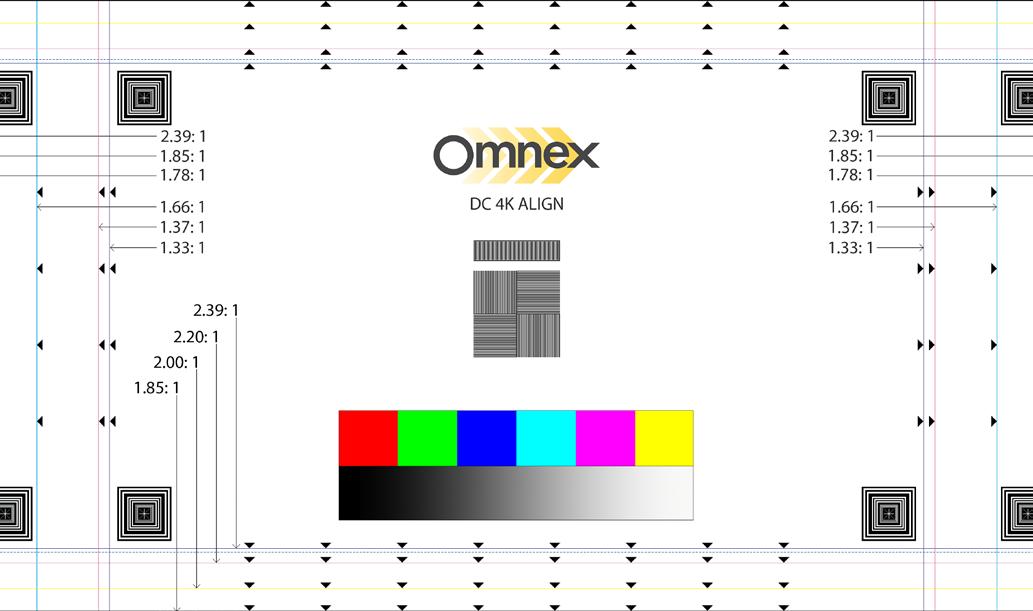
Our recently updated 4k framing chart, was used to ensure full frame images across key aspect ratios

“We can all agree that it’s an exciting time to be in cinema”
says Phil Lord, Christie® cinema sales manager. “For us, some of that excitement stems from finding ways to deliver what exhibitors like you are looking for. The Christie team understands that no two cinemas have the same requirements, which is why we continually look to adapt our projectors, technology, and tools to
fit the needs of the market. Whether it’s offering a wide range of projectors so you can find the right light for your theatre, pushing the envelope of what’s possible with HFR, or updating our guides and tools to help you make choices for your theatre, we’re here to work with you to make sure your cinema has what it needs.”
› WE KNOW THE POWER OF LIGHT, which is why you can count on us to offer the widest range of projection to fit your cinema. Whether you want to go big with premium large format (PLF) projectors or you’re looking for an advanced yet affordable fit for your small screen, we’ve got what you need.
If you’re looking to upgrade this year, we offer options that range in brightness from 6,000 to 57,000 lumens, high contrast and ultra high contrast lenses, and a range of illumination options. The best part? With the most energy-efficient projectors on the market, your new projector will actually reduce the costs through energy savings.
› WHEN FILMMAKERS WANT TO PUSH THE BOUNDARIES of magic and technology to enhance the movie-going experience, we’re right there, working with them to make it a reality. One of the ways we do this is by pairing our advanced CineLife+™ PLF
(premium large format) projectors with Mystique Cinema™ for 120fps and 4K 3D per eye. So, when the action happens on screen, motion blur is a thing of the past, and your audiences get visual clarity like never before.
› IT’S MORE THAN FINDING THE RIGHT LIGHT FOR CINEMAS; it’s about finding the best light for your cinema. Simply input the dimensions and desired resolution for your theatre and our cinema calculator tool, CineMaster, will provide the optimal projector and lens combination.

With CineMaster, you can select the projector that offers the brightness, contrast, and features you want based on the unique installation requirements of your auditorium.
› WE KNOW CINEMA LENSES are one of the most underrated heroes in image quality. But how do you choose the one that’s best for your cinema? Do you need HB, HC, or UHC lenses?
Whether you want to learn more about the technology behind the magic of cinematic contrast or you need to know which lenses are compatible with your Christie cinema projector, our updated lens guide has you covered.
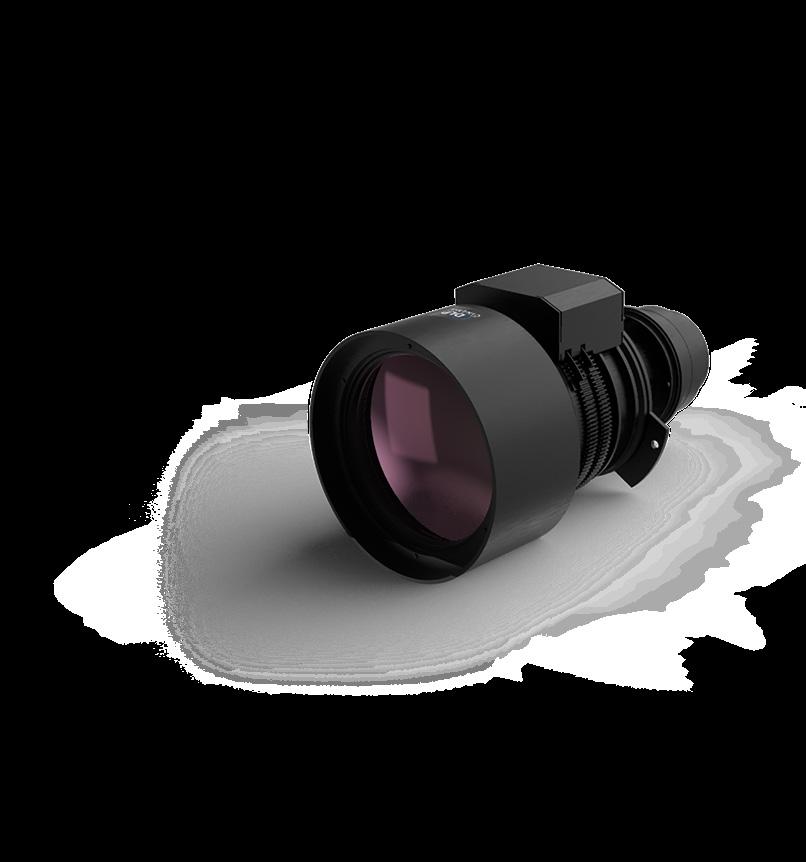
Want to know more?
If you’re ready to purchase or you have more questions, get in touch with us today. Our cinema team is here to help.


The European premiere of Transformers One at Odeon Leicester Square delivered more than just a night of glamour—it served as a strategic promotional powerhouse, designed to captivate audiences across the UK and drive substantial cinema admissions. While it’s easy to think of these events as exclusive to the multiplexes of central London, this premiere, much like last year’s Top Gun: Maverick, demonstrated that red carpet events have far-reaching impacts, creating opportunities for cinemas of all sizes, to engage audiences and boost footfall.
THE SPECTACLE OF TRANSFORMERS ONE: AN OPPORTUNITY FOR CINEMAS
The excitement surrounding Transformers One was palpable from the moment the red carpet rolled out. With the film’s high-octane action and iconic franchise status, expectations were skyhigh, but the true magic lay in how the event was curated for audiences across the country. I had the privilege of managing the live broadcast to cinemas, working alongside Content Creator Studios, who were delivering a well-packaged red-carpet experience complete with interviews with the star-studded cast, including Chris Hemsworth, Scarlett Johansson, and Brian Tyree Henry.
However, while the glitz and glamour of Leicester Square grabbed headlines, the key takeaway for cinemas across the country is how these events generate a treasure trove of content—assets that go well beyond the red carpet itself. From carefully shot interviews from the team at Content Creator Studios to highdefinition photos from Julie Edwards, the event created promotional materials that every cinema, regardless of size, can use to amplify their local marketing efforts.
For those questioning whether these highprofile premieres are relevant to them, consider the example of Top Gun: Maverick. As the manager of that premiere’s broadcast, I saw firsthand how the red-carpet event contributed to an opening weekend surge in ticket sales across the UK. Top Gun: Maverick grossed over $124 million domestically in its opening weekend, and the social media buzz, fueled by red carpet interviews, glamorous photos, and curated behind-thescenes footage, played a significant role in driving that momentum.
Crucially, many cinemas that leveraged the digital assets created by the premiere, saw marked increases in footfall. By sharing star interviews and exclusive red carpet content on their social platforms, these cinemas generated local engagement and helped turn the national buzz into local ticket sales.
The Transformers One premiere is no exception. The event generated high-quality social mediaready content, with professional photos and

exclusive video footage made available in realtime - with cinemas able to seize the opportunity to use this content to create a sense of eventdriven urgency. By sharing this material on their own platforms, cinemas can enhance their local marketing efforts and create a direct connection between the excitement of Leicester Square and their local communities.

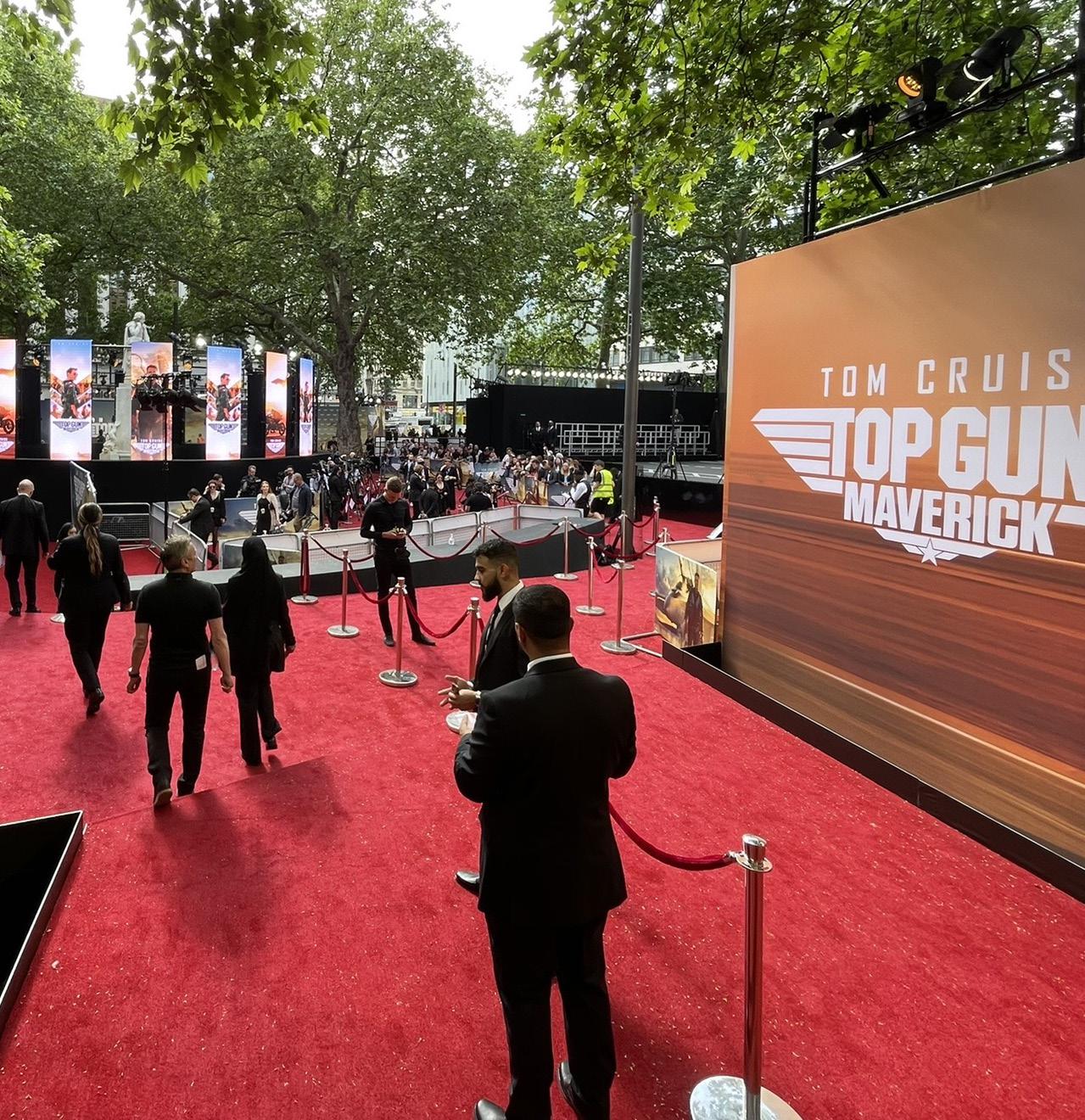
Research supports this. According to the Event Cinema Association, event-driven content such as red-carpet premieres increases cinema admissions by up to 20% during a film’s opening week. Furthermore, social media engagement from red carpet events can generate up to 10 times the reach of standard promotional materials. For cinemas, this means real, tangible value in being part of the red-carpet buzz, even if they’re not physically at the premiere.

If cinemas truly want to thrive in a competitive market, embracing the assets created by these high-profile premieres is key. Red carpet events like Transformers One are not just for the few in Leicester Square; they are marketing tools designed to create national excitement. By utilising the stunning photography, exclusive video footage, and social media clips made available from these events, cinemas can build localised campaigns that draw on national buzz, driving footfall and increasing engagement.
The Transformers One premiere showed once again that red carpet events are much more than a central London spectacle. These events create a vast array of promotional materials that can help cinemas across the UK engage their local audiences and drive admissions. For cinemas, the key is to tap into this national buzz and use it to create excitement at the local level. With the right approach, every cinema can make these high-profile events their own. By embracing these opportunities, cinemas are positioned to thrive in a competitive landscape, driving admissions and building lasting relationships with their audiences.

Omnex is a cinema technology company headquartered in Aylesbury with an experienced team of cinemafocused professionals.
Our UK-wide team of engineers are all qualified to install and support all major cinema projection equipment. In addition, we are distributors of all major cinema sound and server equipment, as well as automation, video distribution, and conferencing systems. Our website, www.omnex.co.uk offers affordable pricing on a range of cinema sundries.
Despite the impact of the Covid pandemic on the industry, we have reduced our Annual Service agreements and offer monthly payment options — via Direct Debit if you need. This allows us to provide annual service and support from as little as £59 per month.
Our support includes 7-days a week, 8am
until 10pm remote intervention via your internet connection, with a dedicated engineering team available for remote support during those hours.
We also ensure that all software/firmware is up to date and includes full projector servicing and audio EQs annually. Furthermore, we have a dedicated Cinema Seating Team for sales, installation, and repair. We pride ourselves on delivering the best-value so that cinema can remain the best place to watch content. The big screen experience is in our DNA.
We are proud to work with a range of leading suppliers and the following pages allow us to introduce you to the innovative products that they offer. If you’d like to know more about these suppliers and indeed the full range of products and services Omnex can support you with, please drop the team a line: info@omnex.co.uk
Christie ® Phazer ™ is the affordable, future-proof, laser solution for smallscreen cinemas. It combines a new, enhanced laser light source with CineLife+ 2K™ electronics to produce brilliant DCI-compliant onscreen visuals. This highly efficient illumination technology is designed to seamlessly integrate with boutique theatres for the optimal viewing experience, even on high-gain screens.
To serve the entire market, Christie rolled out Phazer in three new projectors that produce 6,000, 9,000, and 11,000 lumens. The CP2406-RBe, CP2409-RBe, and CP2411-RBe maintain the 50,000 hour laser lifetime, have fully sealed optics, and the same low-maintenance benefits of other Christie laser projectors, sharing the most advanced cinema electronics platform, CineLife+. That means the RBe models include electronic color convergence (ECC) for perfect color alignment, backward compatibility with existing Christie accessories, an easy-to-operate UX for playback, scheduling, and content management, and enhanced wavelength diversity (EWD) to improve image performance on high-gain screens.


Now the energy efficiency of laser comes to cinemas requiring less than 10,000 lumens. While previously Xenon cornered the market, these new laser projectors are up to 292% more efficient than Xenon projection, which translates to major energy savings for exhibitors. During non-operating hours, these projectors can also be placed in an ultra-low power standby that consumes less than 3W.
As the technology used to film movies continues to expand, Christie has made it their mission to keep cinema projection just as capable. In preparation for films like the next Avatar debuting in December 2025, upgrading to laser with a robust and adaptable electronics platform becomes essential. This new, enhanced laser light source supported by a reliable and proven electronics platform is exactly that for theatres in the 6,000 – 11,000 lumen range. Set your projector’s visuals to: stunning, with Phazer!

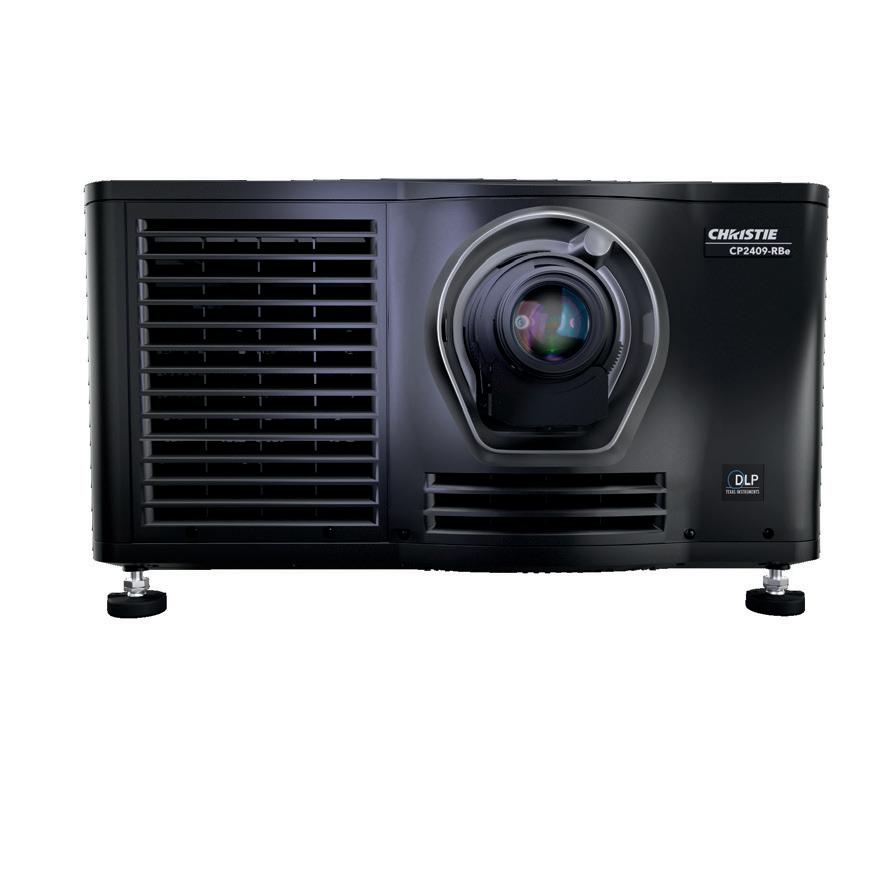
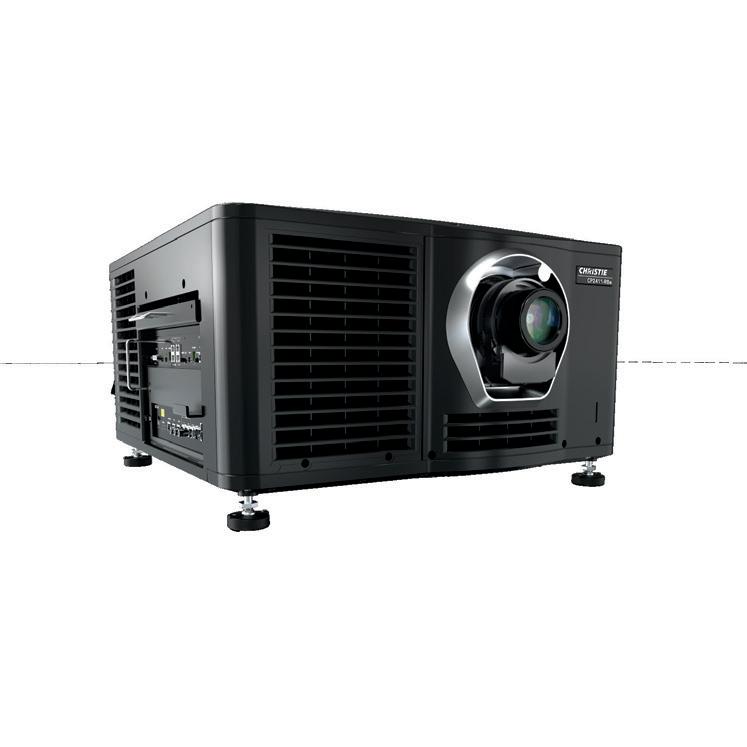

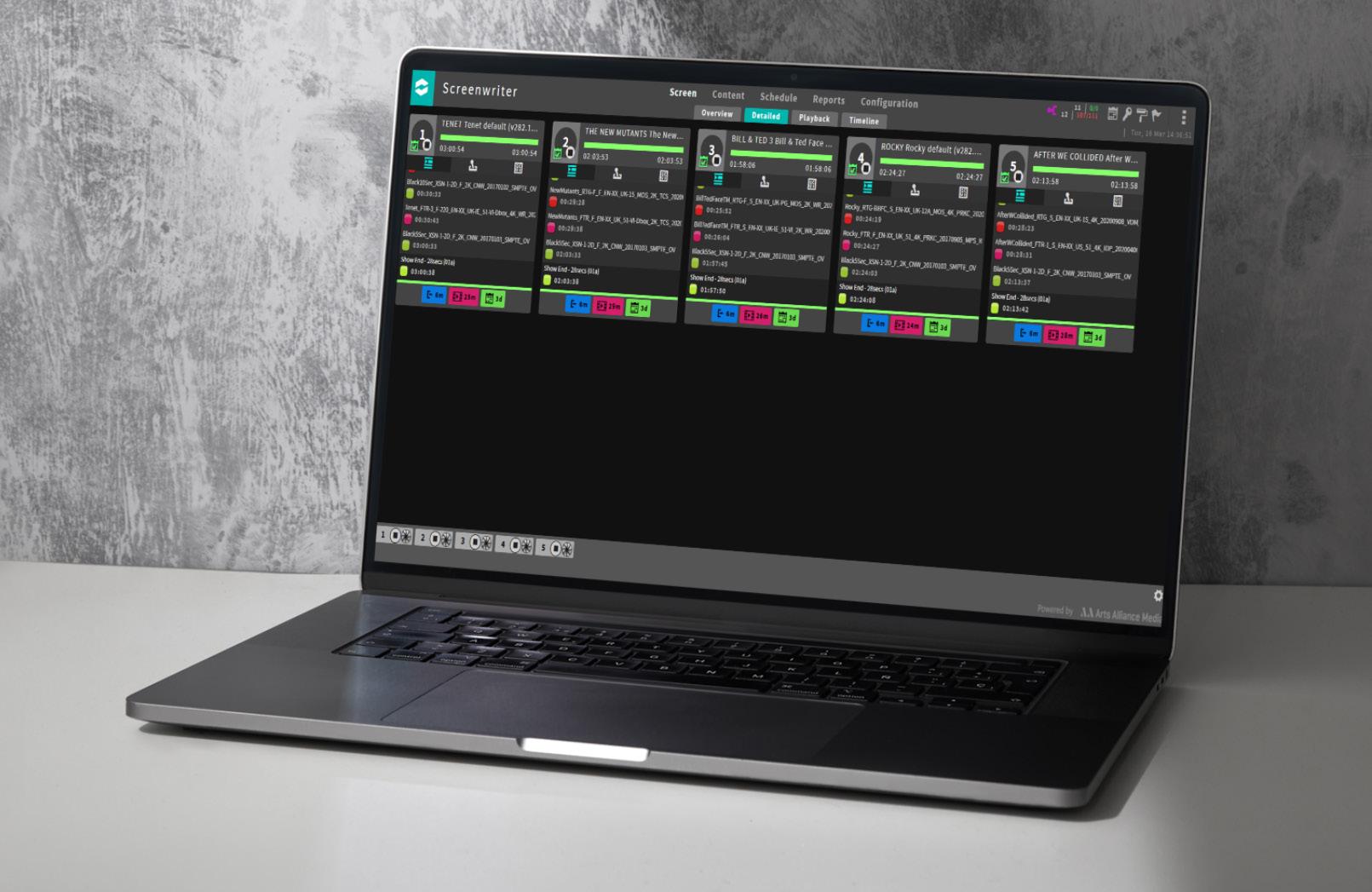
Designed to increase operational efficiency, Screenwriter presents a multitude of energysaving features that help cinemas to act more sustainably.
Now more than ever the need to operate more sustainably has become essential; a conversation that has developed within exhibition as the subsequent time and cost savings of progressive software are revealed. Leading the charge for change is Screenwriter, a trusted and long-established Theatre Management System (TMS) that powers over 44,000 screens worldwide, and its powerful automation is proving the difference maker.
Screenwriter remains the industry’s leading tool for theatre manage -ment.
By automating manual tasks, controlling content with ease, and centrally monitoring screens and playback, exhibitors are reducing energy consumption and optimising resource allocation to make significant time and cost savings. The art of automation not only improves the quality of daily operations, but contributes to a more eco-friendly and financially sound future to further align with the evolving needs of modern audiences.

FROM ONE CENTRAL LOCATION, a single Screenwriter user can manage every area of their operations. By scheduling content, managing KDMs, monitoring screens, and controlling playback, all from a single, easy-to-use dashboard, exhibitors can save time and energy actioning manual, repetitive tasks to build workflow efficiency.
SAVING ENERGY AND OPERATIONAL COSTS, Screenwriter will allow users to create a set of shutdown commands for each screen, known as Auto-Show Cancel, that will trigger up to 30 minutes into a movie where no tickets have been purchased. In this instance, Screenwriter will interrogate the POS and shut down the screening.
HARNESSING ‘BOOKENDS’ FUNCTIONALITY, Screenwriter users can prepare ‘Start of Day’ and ‘End of Night’ playlists, which can be scheduled before and after the first and last show in each screen, to eliminate the need to power systems up upon arrival or keep them running idly at night. This enables each screen to automatically power down at its earliest possible point to save energy and money.
WITH E-DELIVERY, OR ELECTRONIC DELIVERY, vendors can integrate with the AAM Cloud API to deliver content straight to Screenwriter, a process which provides vendors and exhibitors with an accurate delivery status with end-to-end visibility. Without the need for a courier to personally deliver and transfer content, the industry can benefit from a modern, carbon-neutral form of delivery.

LIVE THE TRUE CINEMA EXPERIENCE
Featuring Trinnov’s Optimizer active acoustics technology, Trinnov and Omnex deliver next level cinema experience, with best-in-class sound reproduction.
Immerse yourself in a world of sound!

The next generation of TIME PHASE FREQUENCY
RHM Telecommunications are a key technology partner of OMNEX & Motion Picture Solutions.
As part of Motion Picture Solutions’ drive to deliver content digitally, RHM have supported them with rolling out Broadband services into Cinemas across the UK.
RHM are here to support the Cinema industry with advice, consultancy, products and services.
If you negotiated a long-term contract before the rise in energy prices then you may be in for a big shock when it comes to your next renewal. Right now though you may be able to negotiate a reasonable renewal, as due to a warm winter prices have fallen sharply.
RHM offer an Energy brokerage service that tracks the top 23 UK suppliers. Simply send us a bill to enquiries@rhmtelecom.com and we will give you a free report on how your current package would compare to what is available in the market today.
https://www.rhmtelecom.com/energy/
Internet
There has been an explosion in investment-backed alternative fibre providers rolling out Fibre Broadband. This has resulted in the market for Fibre Broadband becoming very fragmented. It might sound complex, but working with an alternative provider can save you money.
It is estimated by some analysts that by the end of 2026 35% of the UK’s Fibre Broadband will not be supplied by BT Openreach.
It’s a perfect alternative to a leased line connection that can end up costing cinemas hundreds every month.
To see the services available in your area, use our broadband checker at https://www.rhmtelecom.com/broadband-checker/
At the end of 2025 BT is intending to switch off all their traditional telephone lines.
These are lines that Cinemas use to deliver Broadband, alarm lines, lift lines, or phone lines connected to a telephone system. Businesses need to start thinking about how they are going to navigate this change, RHM can help.
We can help you put a plan of action together to assess what you have on your estate now and how you can get 2025 switch-off ready. More information is available at https://www.rhmtelecom.com/isdn/
Laser has many benefits, and Barco continues to invest in laser innovations for every cinema screen for the long-term. It’s a smart and future-ready investment that brings value for both you and your audience.
Laser has many benefits, and Barco continues to invest in laser innovations for every cinema screen for the long-term. It’s a smart and future-ready investment that brings value for both you and your audience.
Improve image quality
Improve image quality
Your audience will enjoy a better movie experience thanks to laser. Boost your brightness, contrast, and color and guarantee a consistent brightness over time.
Your audience will enjoy a better movie experience thanks to laser. Boost your brightness, contrast, and color and guarantee a consistent brightness over time.
Moviegoer satisfaction
Moviegoer satisfaction
Picture quality is the number one factor influencing a moviegoer’s decision to see a movie in a theater. Laser projection improves color quality and brightness levels, which matters significantly to 68% of moviegoers.*
Picture quality is the number one factor influencing a moviegoer’s decision to see a movie in a theater. Laser projection improves color quality and brightness levels, which matters significantly to 68% of moviegoers.*
Explore a complete range of next-generation laser projectors and discover outstanding image quality and worry-free operation for every screen.
Explore a complete range of next-generation laser projectors and discover outstanding image quality and worry-free operation for every screen.
• Brilliant images consistently delivered
Simplify your operations
Simplify your operations
Laser projection makes running your theaters simpler by improving operational efficiency. It implies less storage, less staff training, and less maintenance.
Laser projection makes running your theaters simpler by improving operational efficiency. It implies less storage, less staff training, and less maintenance.
Reduce resources
Reduce resources
With laser projection, you can cut costs up to 70% by reducing your power consumption, minimizing heat dissipation, and increasing efficiency.
With laser projection, you can cut costs up to 70% by reducing your power consumption, minimizing heat dissipation, and increasing efficiency.

Barco’s added value
Barco’s added value
Extended standard warranty to 3 years
• Brilliant images consistently delivered
• Sustainable and eco-friendly projector platform
• Sustainable and eco-friendly projector platform
• Smart design for worry-free operations
• Smart design for worry-free operations
More reliable SSD storage
Extended standard warranty to 3 years
Doubling standard storage capacity
More reliable SSD storage
Doubling standard storage capacity
*Source: Erm Research Global Study for Barco
*Source: Erm Research Global Study for Barco

We designed Barco Series 4 in collaboration with cinemas for their exact needs. A unified family of next-generation laser projectors. Powering your cinema with a performance and a simplicity you’ve never seen before.
Experience more at barco.com/cinema



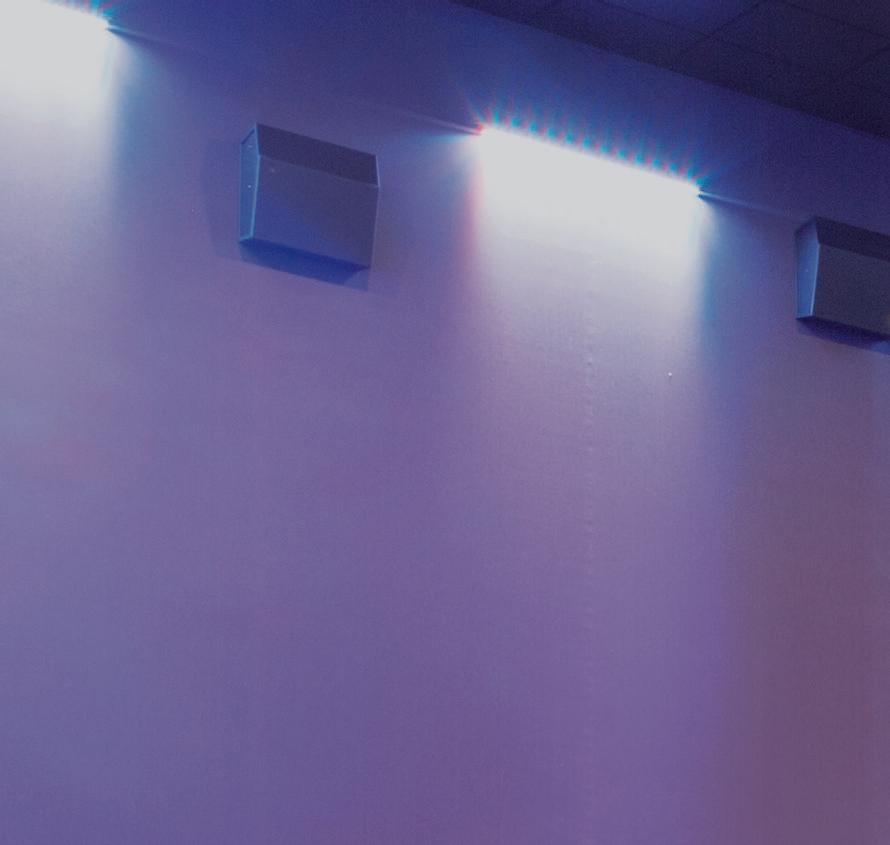
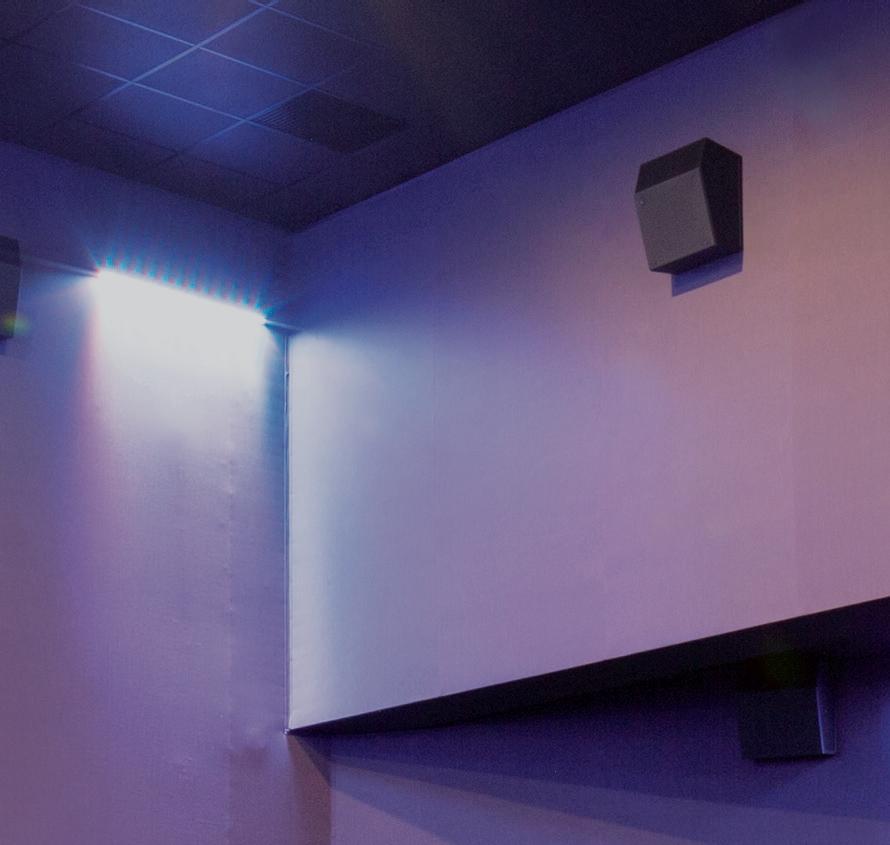

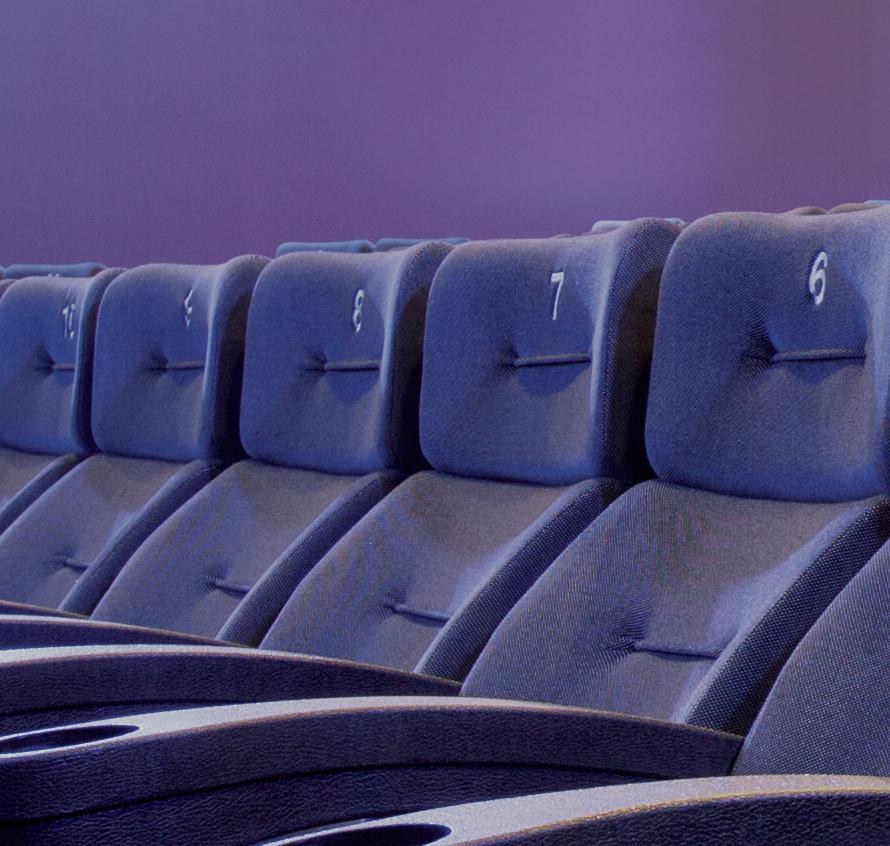
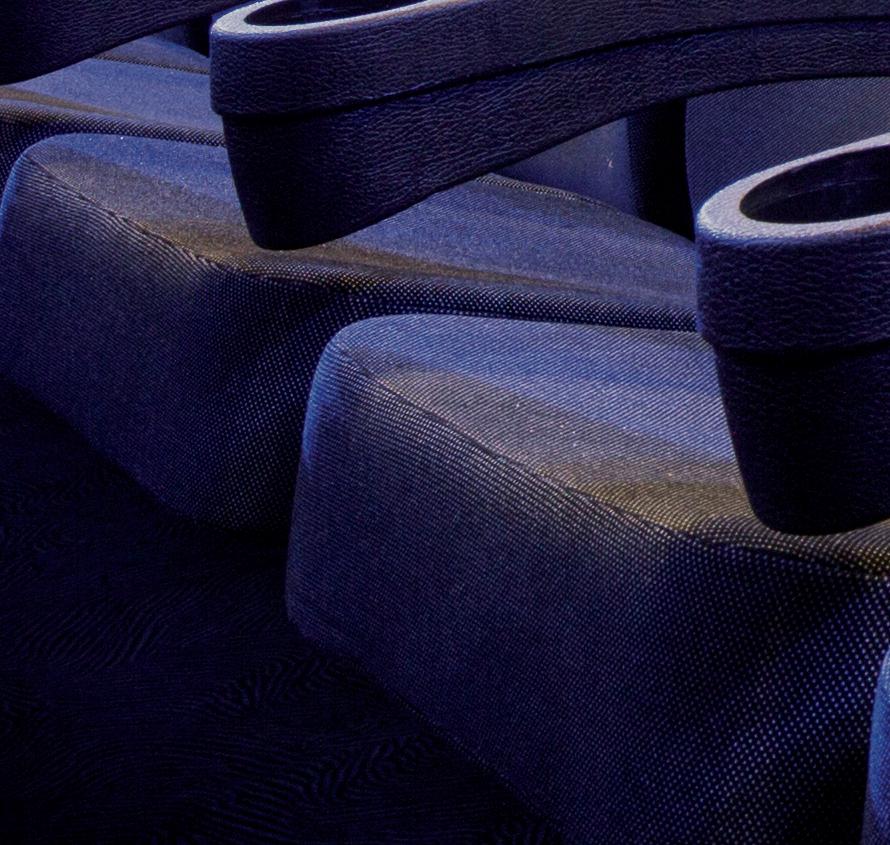

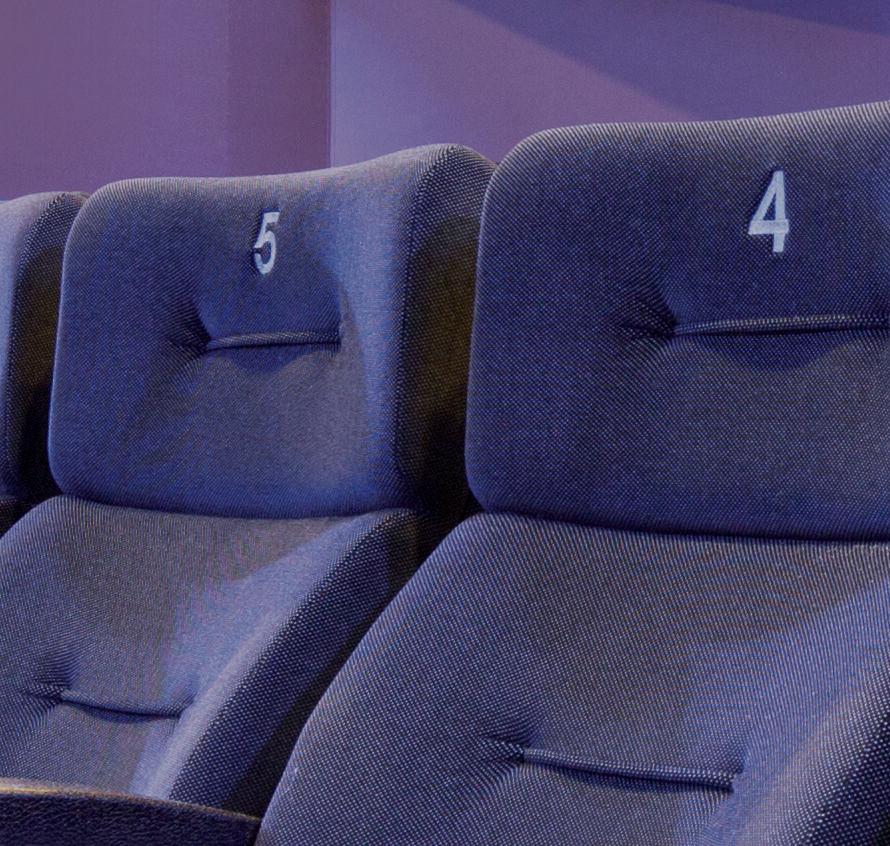
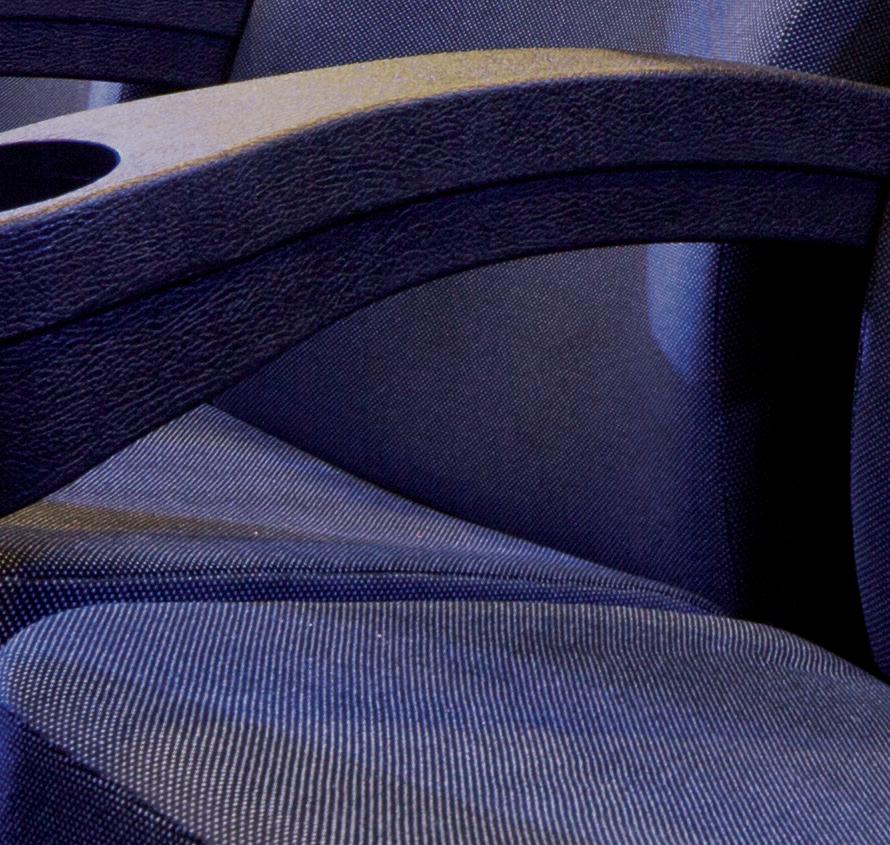
EZCARAY SEATING, founded in 1955, has always been focused in the design and production of seating solutions for cinemas, theatres, opera houses, auditoriums, lecture, press and conference halls, sport venues, stadiums and polyvalent halls.
Thanks to the acknowledged excellence of our designs and the quality of our seats, we continue our international expansion. With projects implemented in more than 80 countries, our exports exceed 70%.
Cinemas are our main line of business; we offer a complete range of products in line with current trends. Whether it is a very large or small project, we have the capacity and commitment to always produce the highest quality and guarantee the best service. This includes the planning out of projects through our technical department, consultation from our experts on seating, the manufacturing and installation of the seats and, finally, follow-up once the project is completed to ensure customer satisfaction.



We manufacture everything entirely in our factory, located in Ezcaray, without outsourcing anything thanks to the various workshops on site. This ensures quality, daily tracking of orders and the ability to customize product designs and create new models when needed.
Should you wish for more information, please feel free to access our website or social media accounts.







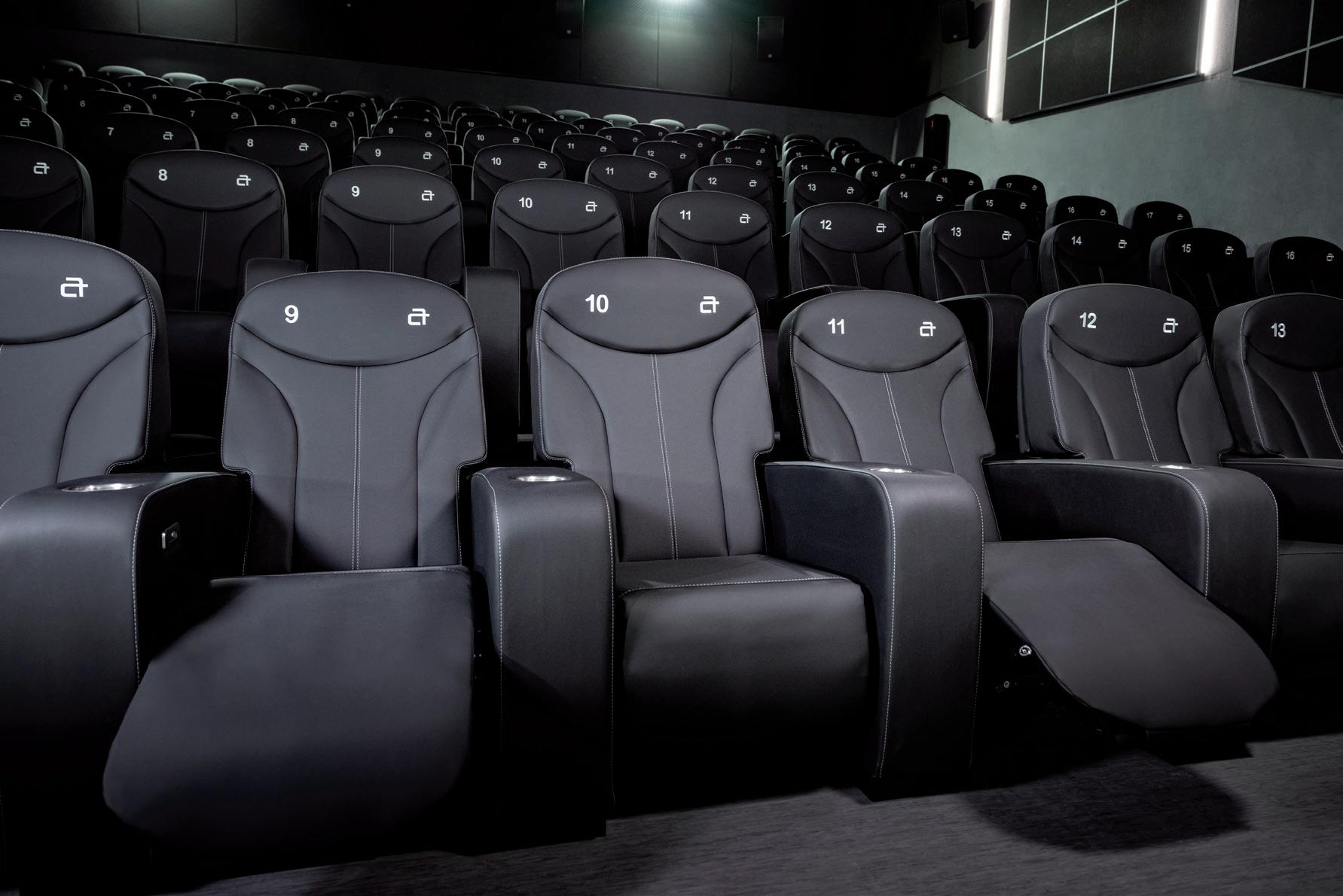
We offer bespoke solutions that fit the needs of each client, granting the space a touch of distinction and elegance


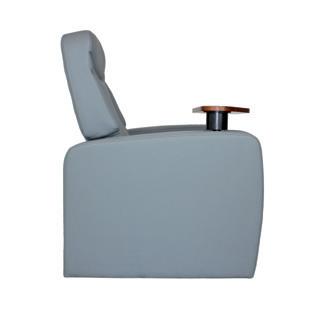



Discover more at sharpnecdisplays.eu

With an unrivalled noise level of less than 39dB, at 6,000 Lumens the new super-silent NC603L Laser Projector is delivering captivating movie experiences, ideal for boothless cinemas.
Incorporating the latest highly efficient Laser technology achieving a low power consumption of just 0.89kW, with a sealed engine for advanced dust protection, impressive 50,000 hours Laser lifetime and legacy interchangeable lenses, the NC603L safeguards low cost operation and long life sustainability.










































tool
See and interact with your remote systems’ user control interfaces from a simple web browser, and resolve issues without putting boots on the ground.
Troubleshoot, update and redeploy design files to systems anytime from anywhere, without the need for complex network or remote desktop configurations.








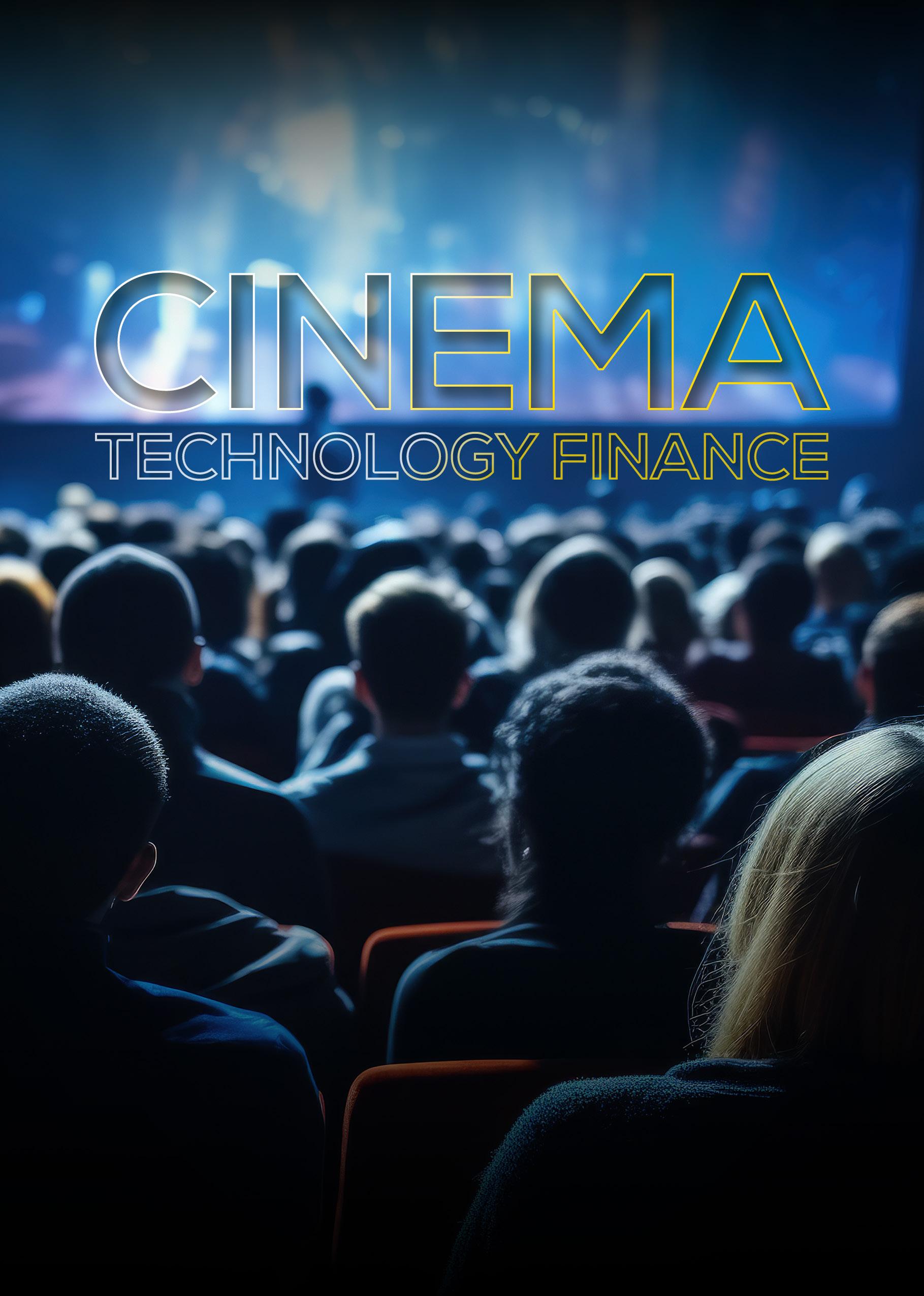


In the ever-evolving world of cinema technology, aging equipment and the end of the VPF mean keeping your equipment up to date is not just an option; it’s a necessity. With the unpredictable nature of film releases and other areas of the business to invest in, proper financial planning is an important consideration. In this section, we’ll explore financing options and our partnership with Medialease.
Consider the scenario: Your projector is showing signs of age, and you’re running out of quick fixes. The upfront cost of a new replacement might feel daunting, potentially diverting funds from other critical areas of your business. However, introducing the option of financing changes the landscape significantly. Spreading the cost over a five-year term with manageable monthly payments not only makes this essential upgrade feasible but does so without an upfront payment. This approach ensures that your cash flow remains healthy, enabling investment in other areas of your business or simply providing a buffer for the unpredictable nature of box office revenues.
Moreover, businesses in the UK may benefit from potential tax advantages when choosing financing. Investing in critical technology through financing can offer tax efficiencies, as payments can often be offset against profit, reducing the overall tax burden. While this should be discussed with a financial advisor for tailored advice, it represents an additional benefit of financing.
At Omnex, especially in partnership with Medialease, we view financing not as incurring debt but as a strategic, managed investment. It’s about empowering your cinema to stay at the forefront of technology, maintaining control over your operations without the constraints of upfront payments. With some of our finance options, the absence of initial outlays or deposits ensures that
the transition to better technology is as smooth as possible, aligning with our ethos of supporting cinemas in their growth and adaptation to changing times.
Reflecting on the era of the Virtual Print Fee (VPF), where cinemas transitioned to digital projectors under strict conditions, today’s financing options offer a breath of fresh air. They provide autonomy, allowing cinemas to upgrade while retaining control over their programming choices. This is a testament to how financing can be a tool for freedom and flexibility in our industry.
For cinema owners contemplating the future, understanding the ins and outs of financing a projector or other technology upgrades is invaluable. It’s not just about preparing for an investment; it’s about strategic planning for sustainable growth and operational efficiency. By choosing financing through Omnex and Medialease, you can embrace technological advancements with the confidence that you are making a sound business decision—one that respects both financial health and long-term vision.
We invite you to contact us to see what we mean. We have worked with several cinemas in this manner, and they are happy to share their stories. For detailed inquiries and to discuss how this can align with your goals, please contact: steve@omnex.co.uk
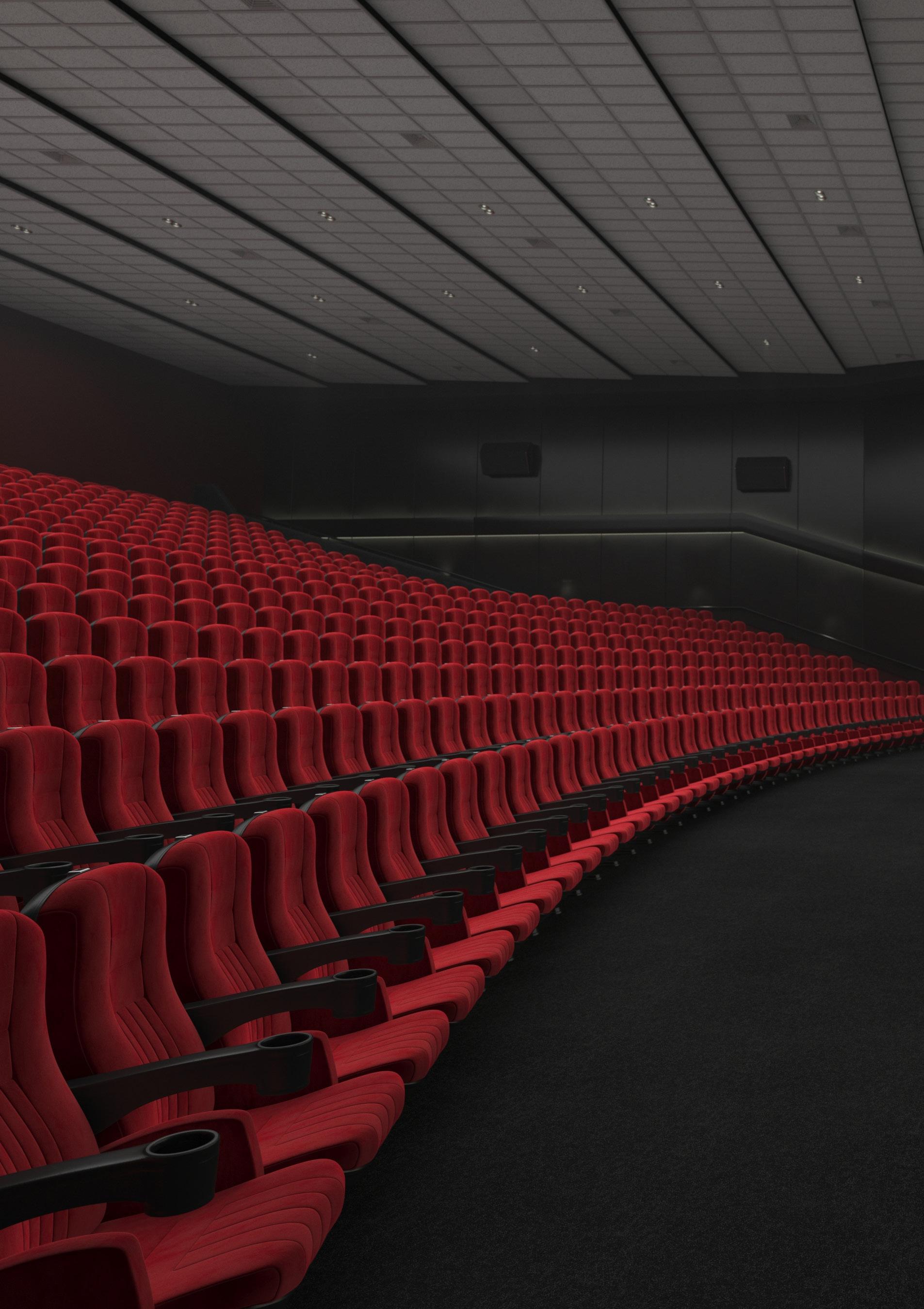
If you’re running a cinema, you know how important it is to deliver the best viewing experience for your audience. But not all projection systems are created equal. When it comes to ‘presenting films as the director intended’ and ensuring the best experience for your patrons, having a DCI-compliant system can make a huge difference. But what exactly does that mean, and why does it matter?
A DCI-compliant system follows strict guidelines set by the industry for picture and sound quality. This means the films you show will be in 2K or 4K resolution—simply put, the images will be sharper, clearer, and more detailed, especially on larger screens. Non-DCI systems may not always hit this high level of quality, which can affect how the audience experiences the film. On the sound side, DCI-compliant systems ensure you’re delivering immersive audio—whether that’s in 5.1, 7.1 surround sound, or even the more advanced Dolby Atmos. These formats ensure audiences hear the full impact of the soundtrack. Non-DCI systems might use compressed audio, which doesn’t sound as crisp or full, potentially reducing the overall impact of the movie.
One of the biggest advantages of a DCIcompliant system is security. Films come in an encrypted format called a Digital Cinema Package (DCP), which can only be played by authorised cinemas with the correct decryption key. This level of protection helps prevent piracy—something that’s hugely important to film studios and distributors. Non-DCI systems don’t offer this level of security, increasing the risk of films being illegally copied or pirated.
If you’ve been in the cinema business for a while, you’ve likely had your fair share of KDMs. These are the encrypted keys that allow a DCI-compliant system to unlock and play a film for a specific
cinema, at specific times, and on specific projectors. They’re essential for ensuring that films are protected against piracy, but they can be tricky to manage.
If you’re showing films in a DCI-compliant cinema, you’ll be familiar with Key Delivery Messages (KDMs). These encrypted keys are essential for unlocking a DCP (Digital Cinema Package) and allowing the film to be played on your specific projector, at specific times, and only for the duration of your license.
To ensure the correct KDM is created, you’ll need to provide certain key information to the film distributor or their trusted KDM management service. This typically includes (i) The server serial number for your projector system, (ii) The screen number where the film will be shown, (iii) The dates and times when the film will be played.
KDMs are usually generated by the film distributor or a specialist company, based on the details you provide. Once created, the KDM is sent directly to your cinema, allowing your system to decrypt and play the film for the agreed time frame. At Omnex we keep the technical information about your cinema close to hand – we can always help.
One of the reasons cinemas opt for DCIcompliant systems is that they guarantee a consistent experience no matter where the film is being shown. Whether it’s an independent cinema or a multiplex, the picture and sound will be of the same high quality. Non-DCI systems can vary a lot in terms of their performance, which can lead to a less reliable experience for your patrons.

DCI-compliant systems are designed with ease of use in mind. Many come with automated tools that allow you to schedule films, manage playlists, and even control the system remotely. This reduces the time spent on manual tasks and minimises the risk of human error. Non-DCI systems often don’t have these features, which means more hands-on management and potential headaches.
Another bonus is that DCI-compliant systems typically receive regular updates from manufacturers, so you’re always in sync with the latest technology. This keeps your equipment running smoothly and ensures compatibility with new releases, whereas non-DCI systems might not be as easily upgradable.
If you want to show the latest major releases from big film studios, having a DCI-compliant system is essential. Most studios only distribute their films in DCP format and require cinemas to meet DCI standards. Without this, you could miss out on screening some of the biggest box office hits, which can impact your revenues.
Technology in the cinema industry is always evolving, and DCI-compliant systems are built to keep up. Whether it’s advancements in laser projection, HDR (High Dynamic Range), or immersive audio, these systems are ready to adapt. Non-DCI systems, on the other hand, might struggle to keep up with the latest innovations, putting your cinema at a disadvantage over time.
Modern DCI-compliant systems, especially thoseusinglaserprojectors,aredesignedtobeenergyefficient, helping you reduce your electricity bills and lower your carbon footprint. Older or non-DCI systems tend to be less efficient, meaning higher running costs and a bigger environmental impact.
Investing in a DCI-compliant projection system might seem like a significant upfront cost, but the long-term benefits make it worthwhile. You’ll provide your audience with the best possible viewing experience, protect your films from piracy, and future-proof your cinema for years to come. Non-DCI systems can offer a lower-cost alternative, but they often come with trade-offs in terms of quality, security, and access to major films.
For cinemas looking to stay competitive and keep patrons coming back, a DCI-compliant system is a smart investment.
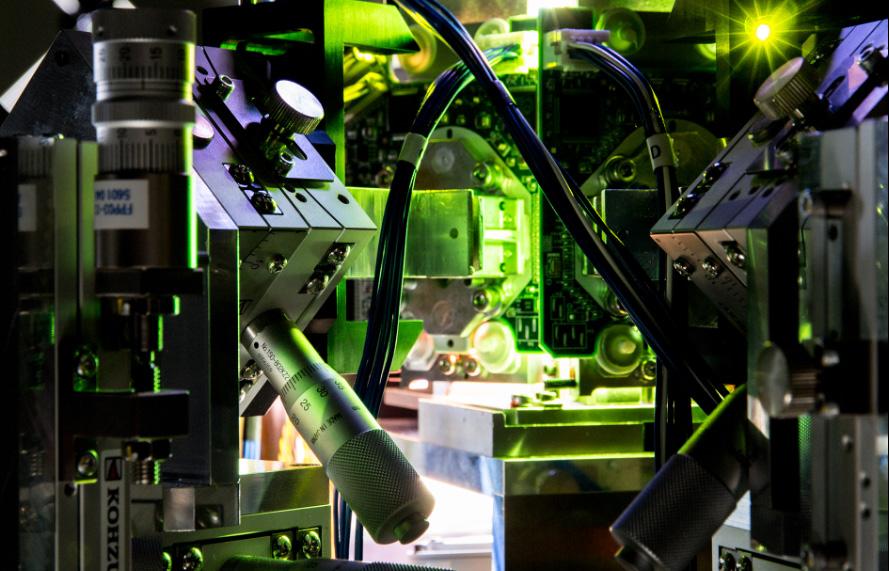

“Infomercial?” You say! Whilst it’s fair to say that we invest a lot of time into ensuring the correct projector model is selected to suit each auditorium, it should also go without saying that the manufacturers we work with take R&D and the entire cinema experience to heart. So - and whilst other manufacturers are available - we’re proud to share an article drafted by Jens Kayser, NEC’s European Head of Sales, who has equal pride in the work NEC/Sharp provides to cinemas around the world.
Maintaining cinema projection equipment in optimal condition is key to delivering a memorable movie experience, and it also extends the lifespan of the equipment, protecting your investment and supporting sustainability.
Sharp/NEC Cinema Solutions has long been a leader in the field, with their industry-leading service operation designed to ensure that cinemas maximise the benefits of their projectors for years to come.
One of the standout features of Sharp/NEC’s digital cinema projectors is their advanced laser technology, which offers an impressively long lifecycle. Known for meticulous Japanese engineering and best-in-class components, Sharp/ NEC ensures that cinemas continue to deliver highquality visuals long after the warranty period ends. An early trial at ODEON in 2007 showcased the durability of this technology, with projectors still in operation 17 years later—an impressive testament to Sharp/NEC’s commitment to quality.
The company’s approach to service excellence is equally notable. Sharp/NEC, in partnership with Omnex, provides UK-based support to ensure any downtime is minimised, with spare parts available 24/7 and expert assistance on hand. In fact, replacement parts are often delivered door-todoor within just six hours, a vital feature for cinemas where equipment reliability is crucial to avoid revenue loss.
Sharp/NEC also offers extended warranty options to fit a cinema’s operational needs, with coverage extending by 1, 3, 5, or even 8 years. For cinemas that experience reduced performance or have non-operational projectors, the Prism Refurbishment Program offers a quick, costeffective solution. This programme is particularly useful for older equipment, allowing cinemas to continue operating without the need to reinvest in new projectors. The refurbishment process not only helps prolong equipment lifespan but also reduces waste, contributing to more sustainable operations.
Another significant advantage of laser technology over traditional Xenon lamps is its energy efficiency. Laser projectors generate less heat, removing the need for external cooling systems and cutting down on overall energy consumption. In addition, Sharp/NEC’s optically sealed light engine ensures consistent performance without requiring lamp or filter replacements, saving both on labour and consumable costs. For cinemas, this translates to greater operational efficiency and reduced environmental impact over the long term.
As Jens Kayser puts it: “Our goal is to ensure that our projectors continue delivering high-quality visuals for many years, while also supporting cinema operators with reliable service and sustainable solutions.”
With a robust support system and technology that prioritises longevity and efficiency, Sharp/NEC is a trusted partner for cinemas seeking to deliver exceptional movie experiences while also maintaining cost-effective and environmentally conscious operations.
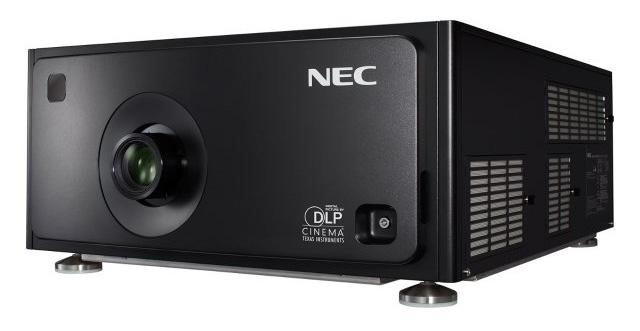
The Sharp/NEC NC603L is a compact powerful laser projector ideal for smaller to midsized screens. Offering virtually maintenance free operation and a specified laser lifetime of up to 50,000 hours, it ensures long-term operational savings by eliminating the need for lamp replacements or filter changes. With low power consumption, it reduces overall energy costs while maintaining exceptional image quality. The projector’s compact design makes installation simple, even in limited spaces, and its quiet operation enhances the movie-going experience. For cinemas looking to invest in reliable, energy-efficient technology that delivers brilliant visuals while lowering operational costs, the NC603L is a smart, sustainable choice.

In August, Omnex signed up to the Barco Partner Program, offering us a unique opportunity to support cinemas with improved value, service and support. In a double-whammy of events, we were then selected as a Barco Post-Production Partner. A reflection of Barco’s confidence in our capabilities! To better understand both accolades, Simon Tandy, MD and Steve Case, Technical Sales Manager headed to Barco’s HQ in Kortrijk, Belgium and experienced two-days of how the world turns at Barco.
Our visit kicked off with a warm welcome from Oliver Pasch, VP of Sales & Business Development for Western Europe, and his team. We began with a tour of the Barco Experience Centre, which showcases the wide range of technology they’re known for, from medical imaging to corporate AV solutions. But, of course, our main focus was on Barco’s cinema technology.
We were treated to an impressive demonstration of Barco’s laser projection systems, which are designed to deliver stunning brightness, contrast, and colour accuracy. Watching the crisp, lifelike images projected was a reminder of just how far cinema projection has come. After that, we had the chance to get handson in Barco’s cinema training room, where their senior trainer, Frédérick Lanoy, walked us through the technical features of their projectors. We even learned how easy it is to pull out and replace a laser plate!
Marc Arts, Business Segment Director for Digital Cinema, also shared valuable insights on the importance of projector and screen choice. From image clarity to understanding lifespan, warranty, and budget requirements, it reinforced the significance of getting every detail right in cinema design.
Day two was a cinema enthusiast’s dream! We visited the local Kinepolis, a cinema that exclusively uses Barco projectors. There, we put Barco’s Series 4, 2K and 4K projectors to the test across different screen types and gain levels.
The S version of the Series 4 is great for smaller venues, with a focus on energy efficiency and compact size. The C version ups the game with brighter output and can have either 2K or 4K resolution, making it ideal for mid-sized venues where sharpness and vibrant colour are key. Finally, the B version is a powerhouse for largeformat screens, delivering ultra-high brightness and incredible detail in 4K.
We tested these projectors with a range of screens, including the Clarus 1.7 silver 3D for an immersive 3D experience and the MDI 1.8 2D for sharper 2D visuals. Each combination showed how 2D and 3D experiences rely heavily on the right screen choice. But it’s not just about performance—there’s a commercial balance too. For example, lower-gain screens require more lumens to achieve the correct brightness, which can mean more expensive projectors. On the flip side, You would typically avoid high-gain silver screens if 3D is not required, with all RGB laser
projectors there is a chance you will introduce some speckle. These tests really confirmed that finding the right projector and screen combination is crucial for delivering the best performance while managing costs.
After our cinema tests, we returned to Barco’s headquarters for a tour of their assembly plant. This was a fascinating behind-the-scenes look at how Barco projectors are built, from start to finish. We saw every stage of production, from initial assembly to rigorous testing before the projectors are shipped off worldwide.
One of the highlights of the trip was seeing a demonstration of Barco’s new High Dynamic Range (HDR) projection technology. HDR promises deeper blacks, brighter highlights, and an expanded colour range, and it’s set to revolutionise the cinema experience. We even got a sneak peek of Transformers One in HDR— currently released in select cinemas across the US—and it was nothing short of breathtaking. The level of detail and the vibrancy of the colours
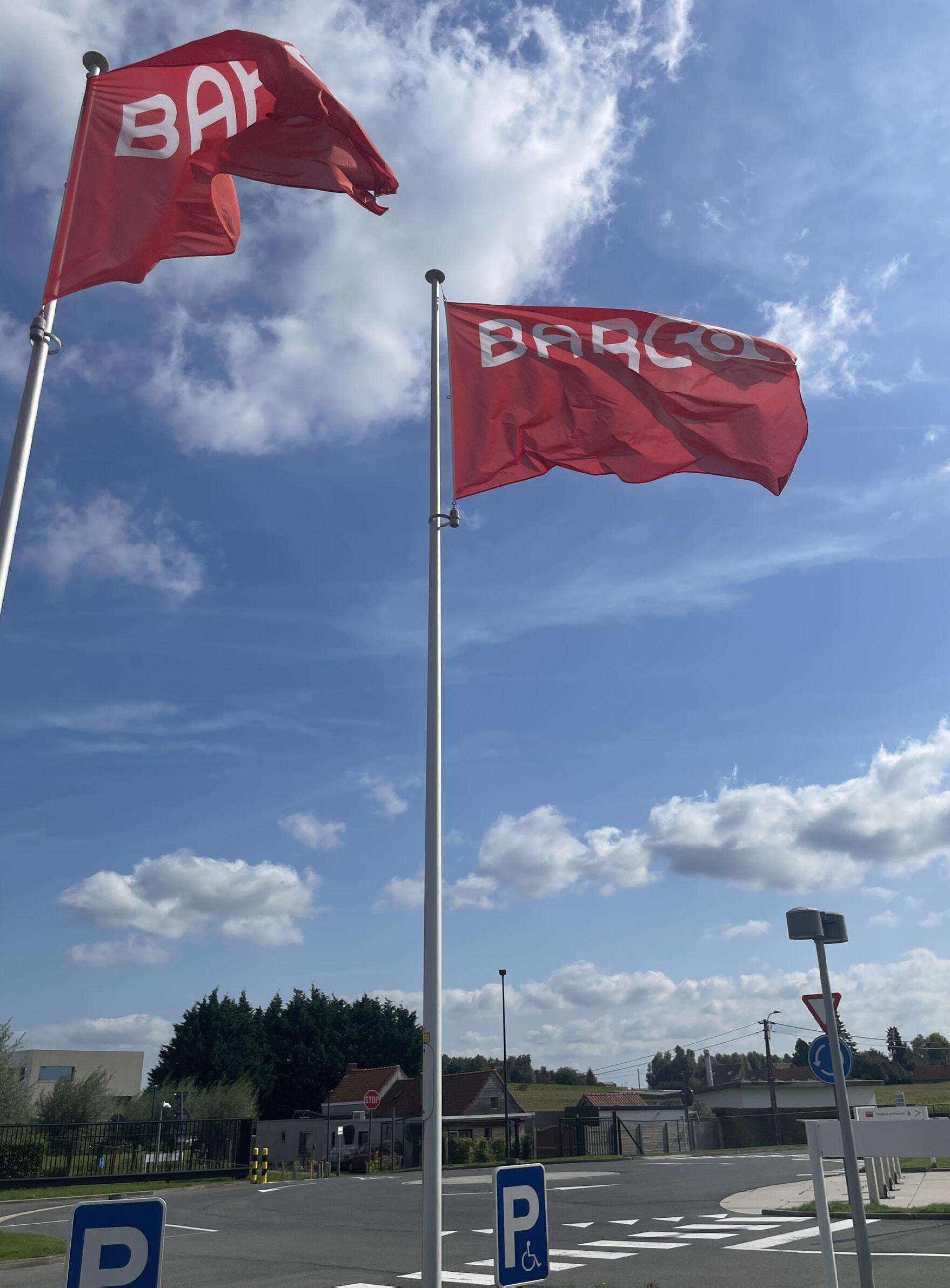
had us both excited about what this will mean for cinemas in the near future.
Our two-day visit to Barco’s headquarters left us inspired and excited about the future of cinema projection. Barco’s commitment to innovation in image quality and reliability ensures that they’ll continue to play a key role in shaping the cinema experience for years to come.
As Omnex prepares to introduce Barco’s latest technologies, including their highly anticipated HDR projection systems, we’re looking forward to offering these cutting-edge solutions to our clients. The hands-on experience and insights we gained during this visit will help us deliver the very best projection technology to the cinemas we work with, ensuring their audiences enjoy an unparalleled movie experience.
Our visit to Barco gave us a rare insight into the technology that will drive the next generation of cinema projection. With Barco’s innovations, particularly in HDR, the future of cinema looks brighter, sharper, and more immersive than ever.



As we gear up for the new season, we sat down with Ed, MPS’s Live Events Manager, to discuss the exciting slate of live content set to hit screens. In this article, Ed reflects on how live programming has grown since MPS started supporting cinemas in 2013 and shares insights into the major technological leaps made during lockdown, particularly the shift to IP streaming.
The Autumn reset is not just a space for students to lament a summer that has flown by; it’s also the dramatic start to a new slate of live content for cinemas to promote around the world.
Live, can often get pushed to one side in favour of the full, saturated, theatrical release of a blockbuster, MPS has been supporting distributors and cinemas in live since 2013.
The "old days " of live via satellite can still send shivers down my spine, particularly knowing that ultimately there are disgruntled customers demanding a comp ticket for a disrupted event, many of which came thanks to inclement weather or AV truck configurations!
The most significant change in live happened during lockdown, as we started the transition to IP streaming of live events.
The step change in bandwidth enabled us to deliver the highest quality streams without risk of buffering and unlocked the ability for more dynamic programming to multiple screens in one cinema.
I sometimes wonder whether the opportunities of live have really been explored? The eventisation of 'anything' is all the rage, perhaps blending live with the traditional programming of the theatrical film could unlock
'bumper content' harking back to the DVD menus of old, showing behind the scenes, Q&A and interviews.
It’s great to see the popularisation of Q&A, I'd love to see more as it extends the shared experience and cements a story into people’s minds for way longer than two hours in a darkened room. Sharing in conversation is how we keep cinema the epicentre of eventised experiences.
We've enabled a wide range of live events, from E-sports with the League of Legends and CS Go Finals for our gamers, a Q&A panel with cast and crew to support cinema titles like James Blunt: One Brit Wonder, and We Dare to Dream as well as exciting live music by Metallica, the MET and Royal Ballet & Opera. We electronically delivered 1000+ encore recordings to cinemas, so customers wouldn’t miss out on this engaging season of Event Cinema.
The MPS live team are here to help you with your IP Live Streaming needs!"

Ed - Live Events Manager events@withmps.com


Meet Mark Bailey, one of Omnex’s cinema engineers with a fascinating background in both film and digital projection. As an MPS Screenings Engineer Mark supported Omnex during the pandemic, leading to him becoming a permanent member of the team just over two years ago. Mark brings with him an impressive range of skills, cultivated from years of working with IMAX projectors, repairing screens around the world, and supporting prestigious film premieres. In this interview, Mark shares his journey through cinema technology, his experience working at Omnex, and how he adds value to the services Omnex provides.
QWhat led you to pursue a career in cinema technology?
It all started when I became a projectionist, working with IMAX film projectors. Back then, projection was very hands-on—there’s something incredibly satisfying about lacing film through an IMAX projector and making sure everything runs perfectly. Working with such high-end technology

really sparked my interest in the technical side of cinema. As IMAX shifted towards digital, I was fortunate enough to join their digital team, and that took me all over the world, fixing IMAX screens. I worked with Arts Alliance Media and IMAX Digital before moving on to Motion Picture Solutions, where I was heavily involved in supporting screenings, including high-profile premieres. That was exciting work, but joining Omnex has been equally rewarding as I’ve been able to work with a diverse range of cinemas, each with unique challenges.
Q Your career sounds quite adventurous, with lots of travel. Can you tell us more about your time on the road? Yes, the travel has definitely been a highlight. One of the more exciting experiences was working on IMAX screens around the world, often at very short notice. I remember being called to fix a screen in a remote location in Dubai and within two hours, I was on a plane, toolkit in hand. There’s a certain thrill in that—the urgency, the technical challenges, and of course, the places you get to see along the way. Whether it’s troubleshooting in a high-tech cinema or setting up screenings in some far-to-reach locations, the variety kept things interesting.
Q What excites you most about your role at Omnex?
For me, it’s the teamwork. The Omnex team I work with is full of really talented people, with such a broad range of skills and knowledge. No matter the problem, there’s always someone with the expertise to help. It’s a very collaborative environment, which I love. I never thought WhatsApp would become such a great resource. The range of projects we handle is also exciting— everything from smaller screen cinemas to larger PLF. It keeps me on my toes, as no two days are the same.
Q How do you feel your experience adds value to Omnex’s services?
think my background in both film and digital projection gives me a broad perspective. At Omnex, we aim to provide our clients with the best service, and I believe my technical skills contribute to that. Whether it’s maintaining the latest digital
projectors or resolving issues with older equipment, I like to think I’m helping cinemas run smoothly, allowing them to focus on delivering great movie experiences. The variety of my past work—from repairing IMAX screens to supporting film premieres—has given me a broad skill set that helps me adapt to whatever the job demands.
Q What’s one of the most rewarding projects you’ve worked on at Omnex?
One project that stands out was a cinema upgrade we did recently where we updated the sound systems and installed an all-laser projector set-up. The complexity of the job was challenging because there was so much to think about in terms of reconfiguration to be able to integrate all of the new technology, but seeing the final result was so good! It’s when you receive feedback from the cinema teams that’s really satisfying.
Q What do you like least about your job?
Honestly, the M25! The traffic can be a bit of a nightmare, but in all seriousness, there’s very little to complain about. The variety of work and the spirit and support I get from within the team make it a really enjoyable place to work.
Q How do you think Omnex provides value to its customers?
I think the monthly payment service plans we offer are a great example. It helps customers spread the cost of their maintenance, making it more manageable and predictable. Beyond that, I think our technical expertise really sets us apart. If I sound cheesy, we don’t just fix things; we work with cinemas to find solutions that work best for them. It’s not always new equipment but optimising what they already have. I feel I get good feedback from the cinemas I work with and that’s something I’m proud of.
Q Finally, what’s your top tip for cinemas?
A weekly reboot of your server. It’s such a simple thing, but it can prevent so many technical issues. It’s easy to forget, but when you make it a regular part of your routine, it helps ensure everything runs smoothly. And, of course, if there’s ever a problem—big or small—to give us a call. We’re always happy to help, even if it’s just advice over the phone.
With the very best engineers across the UK, keeping you on screen is even more cost-effective.




OUR SERVICE PLANS ARE MORE AFFORDABLE WITH PAY-MONTHLY PLANS FROM JUST £59 PER MONTH
In a nutshell? Our pay-monthly service plans are now more affordable than previous annual service contracts and — for plans that don’t already include 24/7 callouts — we’ve made our callout fees cheaper.
Our pay-monthly plans mean you don’t need to pay in full and up front on your service contracts — a benefit we hope will really help you. And whether you choose to pay monthly or not, the annual cost is the same — there’s no penalty for improving your cashflow.
1 2 3 4 5 6
7-days p/week
We aim to save you money, improve cashflow, and keep you on screen - all for as little as £59 p/month.
You can sign up to a our Silver, Gold or Platinum service plans, which combine Omnex’s daily telephone support and remote intervention.
8-5, off-screencall-outs are free - ‘after hours’, Sat & Sunday
7-days p/week all offscreen call-outs are inclusive
Our engineers are geographically spread across the UK to provide outof-hours support 8am - 10pm daily.
All of our support plans provide you with access to our online shopping portal for further discounts on Lamps and sundries.
At Omnex, we’re more than a company; we’re a family of film tech enthusiasts, united by our passion for bringing top-tier sound and projection to screens across the UK and Ireland. It’s been a thrilling ride since our beginnings in 1986, and just like cinema itself, we’re all about the sequels and the next big hits in tech evolution.
From our efficient Aylesbury warehouse team, to the broadest geographical spread of engineers, we’ve blossomed to a crew of 17 dedicated members—each with a story, each with a love for cinema. Add to that the sterling backup from our MPM Engineering pals and the wizardry of our seating technicians, we’re geared up to deliver support wherever you are, whenever you need us.
With thanks to our manufacturing partners and cinema clients, the co-stars of our show! The spotlight’s on the future, and we’re buzzing with excitement to roll out the next phase of the Omnex story with you.
SIMON TANDY
Managing Director, London
Simon started in cinema in 1995, working in indies and multiplexes, then creating the product LANsat for live events and DCP delivery.
REBECCA RAU
Exhibitor Relations Manager
Having started her career in the Motion Picture Dept. at Kodak, Rebecca spent the last decade at DCM managing independent UK cinemas
CHANTAL GUTHRIE:
Head of Seating
Chantal manages a team of nine seating technicians, directing installations — as well as managing more than 44,000 seating checks across Europe.



STEVE CASE
Technical Sales Manager, London “37-years man ‘n boy” Steve has vast knowledge of mechanical and digital systems to support cinemas’ installations.
RICHARD LYON
Warehouse Operations Support
Rich supports our warehouse operations and also provides vital support to our service engineers on bigger jobs.
DANNY LOVERIDGE
Warehouse Operations Supervisor
Danny started at Arts Alliance Media in 2011 as a warehouse assistant and is now responsible for our Warehouse.



NIGEL PRIEST
Operations Manager, W. Midlands
Nigel’s first role in cinema was as an usher at UCI, He joined AAM in 2006, helping to roll out digital projectors for the UKFC.
GLEN WEST
Cinema Services Technician, N. MIdlands
Glen brings his cinema expertise from his time spent at Odeon as he begins his foray as a Cinema Service Technician
TONY EVERETT-SPEARING:
Service Engineer, Suffolk
Based in Suffolk, Tony is an experienced Omnex engineer and considered our expert wireman — he creates order out of chaos in any installation.
KRIS BELL:
Cinema Engineer, Sussex
Starting out in technical theatre. Today, as many cinemas become more multi-functional, Kris’ advice on live sound & lighting is invaluable.
JOHN CASWELL:
Service engineer, Liverpool
John has been a field engineer for more than a decade — prior to that, he was the chief projectionist for FACT in his home town of Liverpool.





DARREN BRIGGS
Head of Technical Services, York,
Starting cinema life in 1999 at City Screen, Darren trained hundreds of projectionists in the digital rollout nationwide.
PETER KNIGHT
Cinema Services Technician, South Wales,
With nearly 30-years of technical cinema experience, Peter has led training courses, premiers & outdoor cinema projects.
Mark Bailey
Cinema Engineer, London
Having been and engineer for IMAX, Christie, Dolby Vision and MPS premiers, we welcomed Mark to the Team in April 2023
BLADE FRAMPTON
Cinema Engineer, South West
Starting as a projectionsit some 25 years ago, Blade was the Technical Manager for Merlin Cinemas prior to joining.
PETE NAPLES:
Senior Engineer, Scotland
Based in Dunfermline, Pete has been a cinema engineer since 1998. He has also worked in television production and is a keen photographer.
GEOFF NEWITT:
Service engineer, Oxford
Formerly head of tech ops at Picturehouse, Geoff has been working in projection rooms since his student days; joining Omnex in 2018.






